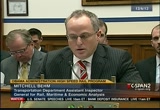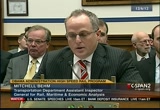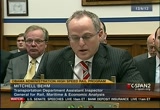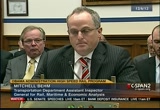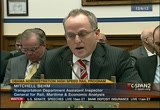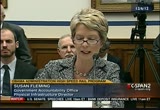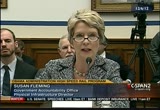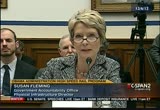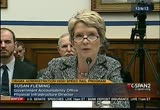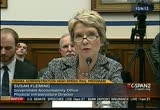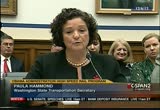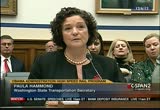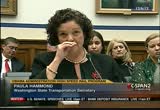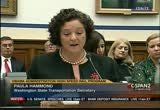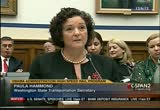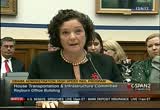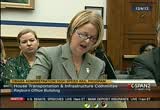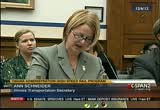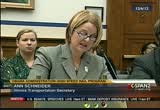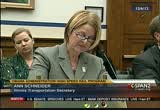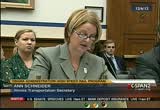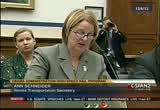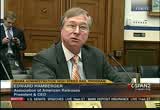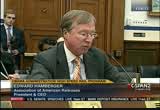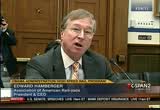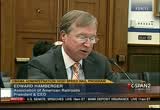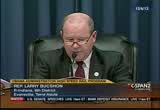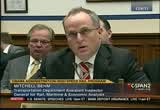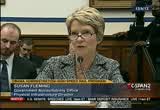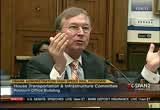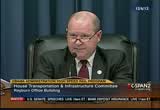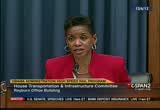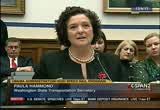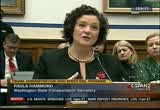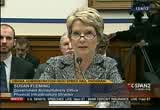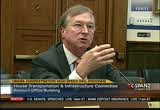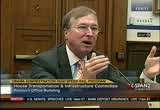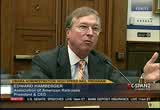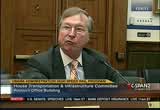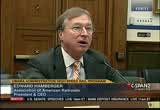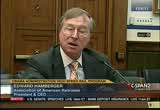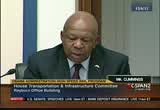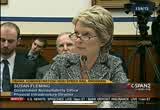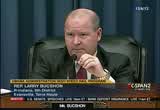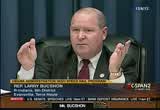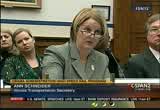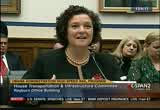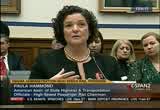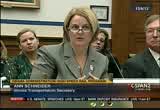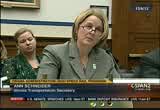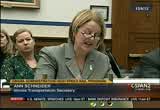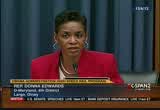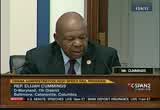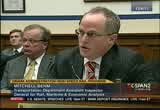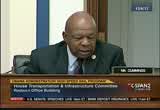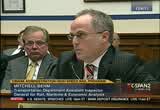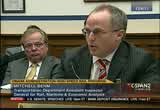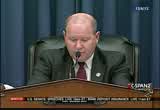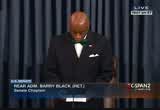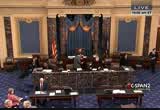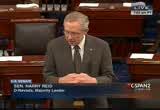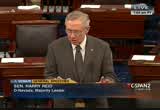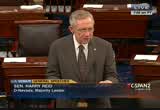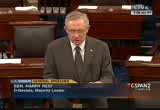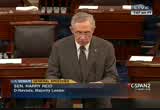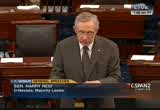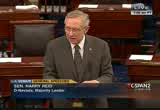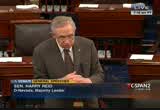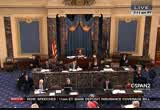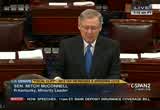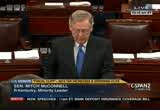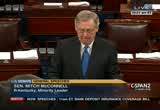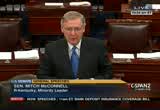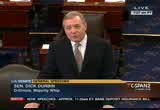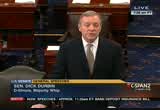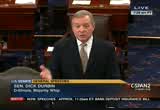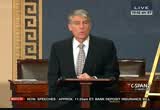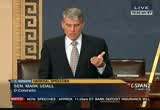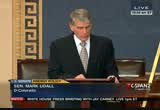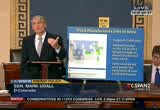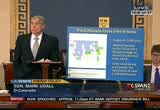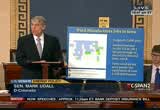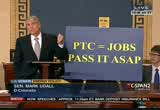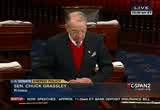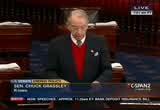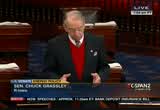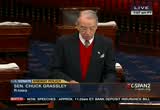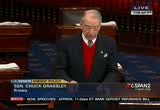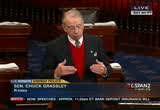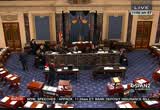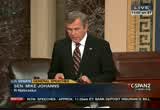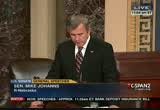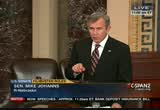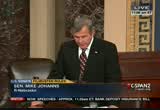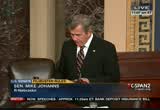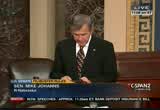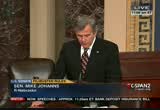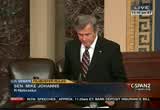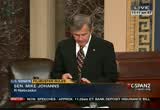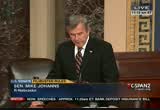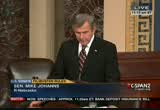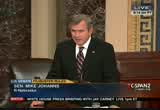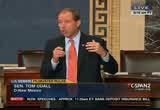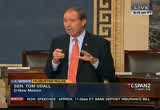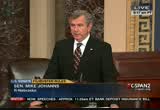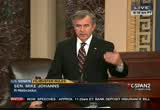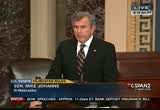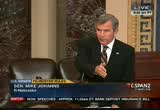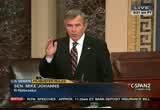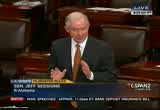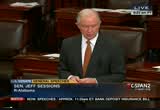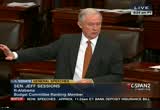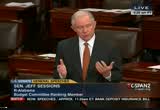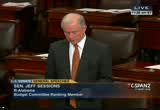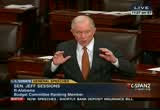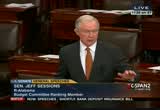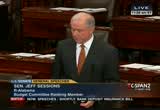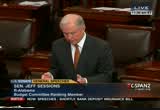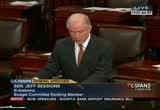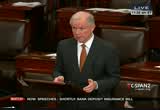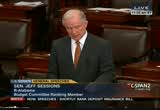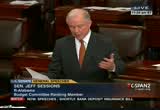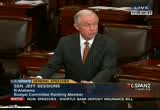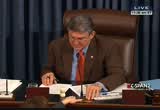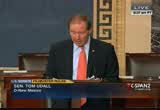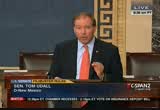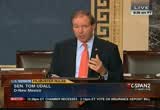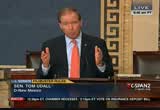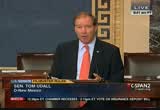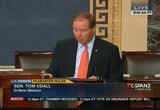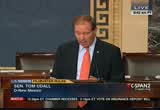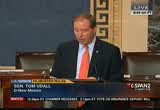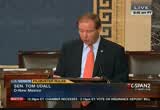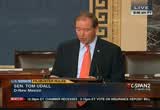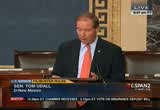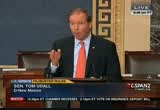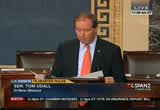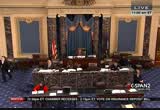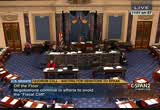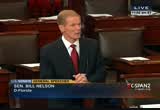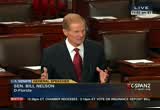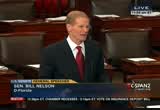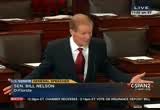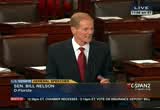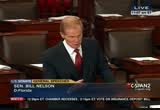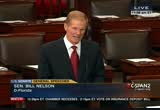tv U.S. Senate CSPAN December 11, 2012 9:00am-12:00pm EST
9:00 am
to establish a sound foundation for credit management framework, fra develop policies and procedures for grant solicitation, administration, oversight and close out. however, as far as. however, have for a has. however, as far as not to build sufficient guidance for staff and great cheese on how to comply with these policies and procedures. through our survey of fra staff, we learned grantees did not always meet the agency's grant application requirements. for documenting project scope, schedules and budget. nine of 12 grantees we interviewed indicated that fra could provide more guidance to help them develop required application documentation. providing guidance on how to navigate the complex grant lifecycle process could help fra prevent any inefficiencies, mismanagement and project delays. fra has established groups to develop this guidance that is not established timelines for completion for all of these were groups. fra's grant management framework also lacks clear strategic and performance goals for accessing
9:01 am
the grant programs progress and grantee performance. for example, the goal to improve reliability, speed and frequency of rail passenger services does not include measures that indicate progress. such as anticipating trains our ridership. and lack of specific performance measures such as as well as inconsistencies across documents containing strategic and performance goals make it difficult for grant managers, decision-makers and other stakeholders to measure progress and identify risks your fra needs to develop a comprehensive training program, one that incorporates its program policies and procedures to ensure staff appropriately and consistently administer funds across all active grant programs. to help fill its trading grabbed fra has required its staff to attend agency provided training, on grant monitoring, applicant outreach and other about the topics. however, and four is not required staff to do returning
9:02 am
to recognize common fraud schemes such as conflicts of interest or false statements claims and certifications. historically, large-scale grant projects such as those on the high speed intercity program have been particularly vulnerable to these types of fraud. fra agree with the recent recommendation to develop a comprehensive grant management training curriculum that includes the required font training conclude that fra expects us to complete the creek and by the end of this calendar year. finally, all stakeholder agreements need to be completed in order for fra to disperse obligated funds to project grantees. prior to publication of for a insured the grantees are all long-term projects completed service outcome agreements. these agreements outlined that result from the infrastructure investments. while every obligated all the funds within the mandated deadline, other required agreements related to maintenance and construction were not complete. that deadline for extending our funds in completing construction is september 2017, a compress
9:03 am
timelines for complex projects such as creating a new rail corridor or expanding or reconfiguring an existing one. for projects with manus and construction agreements that remain outstanding, the time when for completion becomes even more compressed. short-term projects which were intended to stay in the economic recovery have also been delayed. fra originally planned on obligating funds to these projects by september 2010. but did not complete this effort into september 2011 as result of the focus on completing a long-term project agreements. according to fra officials, stakeholder agreement requirements for short-term projects were completed on a case-by-case basis. instead of providing guidance for completing these, grantees of these projects report that without this written guidance they have difficulty understanding of worries expectations regarding the terms of the stakeholder agreements. stakeholders also noted that delays in obligating funds impacted the ability to plan and complete their short-term projects. we will continue to monitor frs
9:04 am
progress in finalizing grant administration guidance steps include program goals and measures, including a conference or training curriculum, all actions we recommend. as was other areas we identified as critical to ensuring a for a's successful imitation of the high speed intercity passenger rail program. mr. chairman, this concludes my prepared statement. i will be happy to answer any questions you may have at this time. >> thank you. >> mr. chairman, members of the committee, thank you for the opportunity to discuss the department of transportation's high speed intercity passenger rail program. as you know, this program was established to provide grants to states and others come to develop high speed intercity passenger rail corridors and projects. as of november almost 10 billion has been obligated for about 150 projects. projects range from multi-billion dollars high-speed rail systems like that in california to smaller projects designed to improve speed, frequency of conventional rail
9:05 am
service. my testimony today will discuss her ongoing review of the california project. i am providing a preliminary observation on our work today, mostly related to project costs. but i will also highlight some of her, the key challenges facing this project. first baseman ongoing review, we have found that the california high-speed rail authorities cost estimate exhibits strengths and weaknesses. we evaluated the cost estimate according to geos cost guide which provides best practices for developing reliable cost estimates. we group these best practices into four broad characteristics. whether an estimate is comprehensive, accurate, well documented and credible. a sonar experience, if you -- helps reduce the risk of cost overruns, missed deadlines and unmet performance targets. overall, we found the rail
9:06 am
authority produce generally comprehensive cost estimates, including most project lifecycle costs. however, they are not based on a complete set of assumptions such as how the rail authority expects to adapt existing high speed rail technology to the project in california. the cost estimates are accurate, and they are based on the most and projects go, including inflation adjustment and it contained few mathematical errors. and regards to documentation, while most assumptions and methodology are well documented, in some cases we're not able to trace the final cost estimate back to the source documentation. we also could not verify how certain cost components such as change and stations were counted. having complete documentation is important. so the changes to the estimates can be tracked and updated, and key decisions documented and defensible. finally, with regard to the cost estimate credibility, the rail
9:07 am
authority did conduct a sensitivity analysis and an independent cost estimate, but these were limited to the initial construction segments. in addition, it did not conduct risk and uncertainty analysis to determine the likelihood that the estimates would be met. without these steps, decision-makers cannot identify the risks that may affect the projects cost. moving onto my second point, in addition to developing reliable cost estimates, the california high-speed rail project faces many challenges. chief among these is obtaining project funding beyond the initial 130-mile construction segment. while the rail authority has secured 11.5 billion for federal and state sources, it needs at least 57 billion in additional funding to complete the project. as with any large public infrastructure project, it is relying on public funding. in this case about 81% for the total construction cost.
9:08 am
so financing is expected to come from unidentified private investment once the system is operational. as result of this financing challenge, the rail authority is taking a base approach, building segment is financing is available. however, given that the high speed intercity passenger rail grant program has not received funding for the last two years, and future funding proposals, about federal funding will likely be met with some concern, the largest block of expected funds for completing this project is tentative. the rail authority will also face the challenge of developing reliable ridership and revenue forecasting these forecasts are important to assessing financial viability of the project. factors such as limited data and information, especially early in the project make developing such forecasts difficult. in addition, risk of an actor and biased forecasts are in return challenge for sponsors of the project. research on ridership and
9:09 am
revenue forecast for rail project worldwide have shown that ridership forecasts are often overestimated, and actual ridership is likely to be significantly lower than forecast. other challenges facing the project which may increase the risk of project delays, potential legal challenges associate with state and federal environmental laws, and acquiring necessary right-of-way acquisition. mr. chairman, this concludes my statement. i would be pleased to answer any questions you and other members of the committee might have. >> thank you. ms. hammond, five minutes. >> thank you. mr. chairman, members of the committee, this is an important hearing to think about not only lessons learned through the development and implementation of the high-speed rail programmer looking forward to authorization. us states you are responsible for delivering and operating the rail systems in our states are
9:10 am
committed and encouraging you to continue a rail program of this kind. passenger rail and our states of oregon and washington has been in place since 1994 where we have partnered from the state level with amtrak, and in our state, burlington northern santa fe, in a collaborative approach to an incremental delivery of high and higher speed rail programs and service. so as we've been investing over the years, we see the implementation in the creation of a national vision as a very important part of what we are trying to deliver. we have a 460-mile corridor between eugene, oregon, and vancouver, british columbia. we have achieved in the last year up to 850 passengers, 50,000 passengers, and our growth is increasing year over year in the 10% rate. we have in our state invested over $480 million in capital and
9:11 am
operations in amtrak cascades, which is what we call our program. but it wasn't until the recovery act came that we're able to make significant capital infrastructure improvements on the rail itself. sightings, double tracking, positive train control, all those amenities that will benefit high and higher speed rail, and more frequent service or passenger rail also has ancillary benefits to our freight rail and freight movement in our state. we are, we in oregon are very trained dependent nations. one of the things we're careful about in not only updating our passenger rail program and plan for the future is to look at both freight and passenger rail movement, and how we can coexist in the same corridor together. because that is our plan. we have received $800 million of the high-speed rail program money. we have five projects currently under construction with another five coming into construction in the next year your the
9:12 am
improvements, while the brain important investments in our ability to increase our service also has created jobs, more than 2300 jobs will be created in just the capital infrastructure and the indirect benefits from those jobs. at what we are looking for is the long-term, stable, travel choice for passenger rail in our corridor along the high-five corridor on the west coast it because our states are growing. we can't build enough lanes on highway sideboard we want to provide passenger service. we want trains. we one commuter rail. we want light will come and we want an integrated transportation system for the 21st century that our citizens deserve, and when he to ensure that the taxpayer dollars are well spent. we have an overall positive experience with the high-speed rail implementation. we recognize the federal rail was starting from being a
9:13 am
regulatory agency, trying to move into the grant delivery agency, and we've had some challenges as have they. but they are dedicated people. if their staff and resource at the level that's required to have oversight of the performance of managed system, i believe they will continue to do well and exceed, excel in this program. we do need the written guidance from federal rail administration. it helps us state and as mainline grails know what's coming and know what's expected of us. that can streamline the delivery of the program as it moves forward. we also believe that with the benefits that have been made in the map 21 reauthorization, as we looked korea, the more we can streamline and coordinate, these things like nepa, environmental permitting so that all of the federal u.s. dot agencies can serve as a one dot agency and streamline and find that the processes and environmental
9:14 am
documents can be conned currently delivered and accepted from one agency to another. they are good at it. we have found some efficiencies and streamlining. i think we can expand that to federal rail administration and continued to great success. the other issue we have had is needing consistence guidance from federal rail on the buy american program. we wholeheartedly agree with and encouraged by america, manufacturing created in the united states, and to continue to grow our nation's economy in that way. at we are in a transitional period and we've had some challenges in trying to get waivers for as much as five months on a cliff for a real-time. that probably shouldn't have taken that long as we're in this transitional period. so figuring out how to accommodate the goal by america but finding a way to get there in a transition period i think
9:15 am
would be good. i know i'm out of time, or to enclose. i would just suggest that as we move to paris of we would love to see this program continue. we do know that there are prioritization based investments that should and could be made. performance based investments are the way of the future. we're committed to it in washington state. we support that and we think that taxpayers should continue to see the benefits for the dollars invested. but we also believe that passenger rail is where its advocates were our future needs to go and we appreciate the vision of the president and the administration. thank you. spent thank you for your testimony. ms. schneider, secretary of transportation for the state of illinois. five minutes. >> thank you, mr. chairman, and members of the committee. i appreciate the opportunity today to submit testament to you on behalf of illinois governor pat quinn to give you an update on the high speed in intercity rail program in illinois. first i want to thank the members of this committee, the entire congress and the obama
9:16 am
administration for supporting a healthy intercity passenger rail system. for your leadership on freight rail infrastructure needs and for supporting improved service with words and money. we're grateful for the investments from the american recovery and reinvestment act which has provided more than $1.4 billion for illinois high-speed rail. i can tell you these current investments in illinois high speed passenger rail system are already supporting thousands of jobs and providing economic benefits with much more on the way. and we could not do it without federal help. we need continued federal funding for high-speed rail so we can finish the job that we started and keep our promises to travelers and taxpayers. these investors will continue to pay dividends, and the american people deserve no less. we ask that congress appropriate additional funds for states making these investments, including illinois and the midwest. it would've been the destiny of illinois and the entire midwest had the nation's real system not been centered in illinois in the
9:17 am
mid-19th century? very simply, neither illinois nor the midwest would be the transportation hub of the nation that it is today, and the states diverse economic base would not exist as we know it. fortunately, illinois was made the center of national rail development, and today illinois hosts a 7300-mile rail network that serves as a keystone in moving passengers and freight across the state, the region and the nation. passenger rail service is crucial to illinois multi-mobile transportation network him and has never been more important than today. illinois help fund 28 and trains serving for high just corridors from chicago to milwaukee, chicago to st. louis, and in state from chicago to quincy and carbondale to the west into the south. those trains carry a record 2.2 million passengers last year. ridership growth in illinois has been exceptional, up more than 74% since 2006, and on the chicago to st. louis high-speed
9:18 am
rail corridor, our passengers have increase by 224% since 2006. this increasing public demand is why we were proud to debut higher speed service in october on the dwight to pontiac segment of the st. louis to chicago high-speed rail corridor with secretary lahood and governor quinn on the train. and by thanksgiving we begin delivering that same 110-mile per hour experience to regular amtrak passengers every day. intercity passenger rail is already stimulating development on the corridor in cities like normal illinois where new multimodal station has attracted $200 million in related private investment and in joliet where construction of a new multi-mobile station is under way. plans also include new or improved stations were six other cities on backorder. we have greater 250 new jobs in rochelle illinois where rail cars are for california and the midwest are being built. last week i was able to witness
9:19 am
-- that manufacture the notice to proceed. illinois in the midwest collaboration on high-speed rail began in 1980, but gained attractions in the '90s when a 10 state midwest regional -- regional rail initiative a joint study and prepared a stamp -- plan to upgrade existing track, and passenger rail frequencies and use new technologies to enable faster, safer passenger trains on all of our existing rail corridors. with years of solid planning in place, illinois and its midwest partners were ready to move quickly on april 16 in 2009 when president obama called for a national network of connected high-speed rail corridors. secretary lahood earlier properly compared the president's vision to the 1950s blueprint for building the u.s. interstate highway system. the federal railroad administration awarded illinois $1.2 billion in january 2010 to
9:20 am
upgrade to 110-mile per hour service between dwight and east st. louis a. governor quinn make illinois a full partner in this vision with his commitment of $400 million in state funds for high-speed rail from his $31 billion capital program known as illinois jobs now. federal awards that you also provide funding to construct a key rail flyover in inglewood neighborhood on chicago's south side help improve mobility, and to augment high speed service for chicago st. louis, and for the chicago detroit corridor, which is next expected high-speed rail in the midwest. work is progressing to provide needed positive train control by the fall of 2015 which will enable high speed service to commence on almost 75% of the 285 chicago to st. louis corridor, reducing overall
9:21 am
travel time by an hour. illinois is still moving quickly on its high speed vision, a vision that governor quinn is passionate about and shares with president obama as a key component of a world-class national rail system. please let me reiterate at this point know that i'm out of time that continued federal funding and support for this vision of a national high-speed rail service has never been more critical than it is right there. thank you for the opportunity to testify today. spent and thank you for your testimony. mr. hamberger, good to see you, and you have five minutes. >> thank you, mr. chairman. on behalf of the freight rail members of the association of american railroads, think for the opportunity to be here today. for the record i like to associate myself with remarks of secretary lahood on the leadership that chairman mica has exhibited the past two years in this committee. as secretary schneider and secretary can attest, with passenger railroads all across the country.
9:22 am
approximate 97% of amtrak's 22000-mile system consists of tracks owned and maintained by freight railroads, and the high speed and intercity passenger rail projects under development nationwide were largely but not exclusively utilized great own facilities. in addition hundreds of millions of commuter trips each year occur on commuter rail systems that are at least partially owned by freight railroads. privately owned and operated, america's great redwoods in recent years have been investing more than $20 billion of their own capital to expand and maintain a freight rail network, second to none. in simple terms, we are carrying the load so the american taxpayers don't have to. at a time when there's growing concern about the state of this country's transportation infrastructure, and who should be paying what to do the job and maintain it, freight railroads are making these record investments in the country's rail system to be ready to meet
9:23 am
america's business needs and to help the economy grow in the years ahead. our commitment to continued private investment supports millions of jobs across the country, and spurs economic develop and in, both large and small. secretary lahood and his team certainly understand that america's economic health and global competitiveness would suffer greatly if the integration of future passenger rail, with freight rail operation is not handled smartly. i've often heard the secretary say, and confirmed with him this morning, that it is still his view that yes, america needs a world-class passenger rail system, but not if it comes at the expense of what is already the world's best freight rail system. the aar has long advocated a true high-speed rail must operate on dedicated track and in a sealed corridor. in the meantime, moving to high-speed rail on a mixed-use basis does present significant challenges. these challenges can be more
9:24 am
easily met if five key principles are followed. one, safety has to come first when it comes to passenger trains, sharing track or rights of way with freight trains. differing speeds and operating characteristics must be accommodated for safety as the number one goal. second, capacity issues, including the ability to grow both freight and passenger services of the future, must be properly addressed. on some corridors, current or expected freight traffic levels may mean there's no spare capacity for passenger service. in these cases new capacity will be needed before passenger trains can operate. third, if passenger trains use freight rail world assets and property it is reasonable for the post-freight railroad to expect full and fair compensation. moreover, the freight railroads should not be subject to any new local state or federal tax leadbelly as result of being a partner in a passenger rail project.
9:25 am
fourth, freight railroads must be adequately protected from liability associated with hosting passenger service. finally, each project involving passenger rail service on freight owned tracks in general and the high-speed rail projects in particular has its own unique challenges and circumstances. to mix the two, agreements must be tailored to the specific needs and conditions of each project. freight railroads support passenger rail and support government efforts to grow passenger rail in ways that make economic sense and that complement the freight railroads. freight railroads are therefore committed to working with government officials, passenger rail stakeholders, and others, to ensure a winning result for all parties involved. thank you for your attention. >> thank you, and we will get into some questions here than. mr. behm, your testimony explained the sar of staff said
9:26 am
additional guidance is to help assure guidance with policy and procedures. what efforts are underway to assure this is occurring? what also on the risks if we don't have further guidance to the states? >> we've made recommendations to the sra to enhance the guidance they provided to the states, fra staffers was a state grantees. i think the focus wasn't a matter of i think fra was not willing to provide this guidance but i've easily considering the challenge that they were faced in establishing this program from the ground up. you are ultimately one of the largest discretion grant programs, really interesting things on kind of a critical path basis. and first identifying and developing the policies and procedures, and then going ahead and proceeding with developing this guidance, was the way they
9:27 am
approached it. basically, they have agreed to develop workgroups that our recommendation to kind of get, to get feedback from the state grantees as well as the fra staff in order to ultimately a savage better guidance but in particular, as well as the dollars that are out now as close to the extent there's any future dollars that are appropriated. >> okay, thank you. ms. fleming come you explain the estimates will change as the project moves into construction but does that mean it's fair to say costs will increase? to have a way to predict future cost growth in projects like this? >> no. no, i don't have a crystal bar in that regard but i think our bottom line is that the project is still in the early stages, and we would like to see some of the weaknesses that we have identified, such as the authority to undergo a risk analysis that would help determine whether or not the estimate is too high, too low and by how much.
9:28 am
that would also identify what the key risks are so policy makers and decision-makers can try to mitigate those risks. so at this point we don't know if, you know, the number will change obviously. scope will change. there will be refinements constantly to both the costs as was to the ridership forecast. that's normal with this project. the authority is trying to make those changes for each of the upcoming business plans. that the numbers will change. the tests will help trying to determine the magnitude in terms of the risks and how to address that. >> mr. hamberger, what, in your view what are some of, you explain some of this in your test went, technological legal and adjustable hurdles that we're going to need to overcome if were going to share existing freight rail right-of-way with existing high speed passenger railways spent one of the biggest concerns frankly is safety, and if you have a
9:29 am
disparate set of speech, you know, from the highway experience you know that increases exponentially the risk of accidents. it is true on railroads as well that a faster trained will close the gap to a slow drain faster than expected. grade crossings except for certain speed of a train. if you have a faster trained, a slower train going, how do you maintain a system so that the gates go down in time? in addition, there's different classes of track. as the passenger trains get higher speeds, the track has to be maintained to a greater degree, and as the head here, for example, green and train goes across, it would exhibit forces on the track that might make it unsafe for the higher speed passenger train. all of these things need to be taken into account. spent i think sometimes there's
9:30 am
this impression can using existing track am using existing right-of-way is easier, cheaper than just building new track or same thing is true with highways, that sort of thing. and, obviously, it sounds like, unicom with a lot of the logistical hurdles with a train speed, just assessing that, and straightening all that out, like you pointing out, if something is going to be very difficult and costly. >> indeed. and you also asked about the legal contractual issues. obviously, the freight railroads are in operation to serve america's communities, to serve america's farmers and manufacturers, and get their goods to market. and so that all has to be, make sure as i mentioned, the capacity principle, we have to make sure that there's adequate capacity to keep america's economy moving as well. >> thank you. i yield to ms. edwards.
9:31 am
>> thank you, mr. chairman, and thank you to our witnesses and also for your patience. as you can tell there's a lot of interest on this committee, even on an off day around high-speed rail. so thank you very much. secretary, some on this committee criticized the administration for higher speed rail. i wonder if you can tell us about some of the improvement writers would see as a result of investments that are investing in high-speed rail and not just high-speed rail, and why that would be important? >> well, as an engine in washington state since 1994, we have been working on an incremental approach to growing passenger rail service in our state. as we have additional round trips, additional speeds and additional reliability of service, we are fund our ridership growing year over year. when you think about the unique characteristics of different states, for us in oregon, the
9:32 am
specific testing pacific northwest and the ipod quarter, the northwest corridor for us is linking between some pretty rural areas, but between seattle, vancouver, seattle and portland, oregon, and cha-ching oregon, we have some major business markets and the opportunity for travelers who are tourists to enjoy our rail. for us, it wasn't going to work to start from scratch. immediately institute a high speed rail line. we have too many communities linking to that west coast corridor that wanted to enjoy the benefits of rail, and wanted us as a state to his country being and putting our own state dollars into it, they wanted to see the benefits in that incremental fashion. so for us i think washington state will always be a higher speed or at least in the next 20 to 30 years, higher speed passenger rail program, but it works for us and it works for our businesses and our major communities that it links. also i'd like to say that as we
9:33 am
work closely with burlington northern santa fe on this notion of sharing the corridor, it's a decision that we made, burlington northern santa fe has bought into it, and the notion for us in the amount of increments and passenger troops went into may, the investments we're making on that freight rail line will not only benefit passing travel but our state movement interested as we are most dependent trade state it and as the economy recovers, and their business continues to grow. we think investors are going to help us be very compatible and help continued service in both areas stood let me turn first to ms. fleming on this question of sort of estimating ridership as the way to determine whether it makes sense to develop a line, because i think as secretary hammond has pointed out, they started out with the vision, but
9:34 am
then over time, because of the investments they've made, the ridership has increased which then begs for more investment at different speeds. how is that factored into your analysis about whether there's an efficiency and investing and whether it's the california corridor or another? >> we are still assessing the california's process, the rail authority process for for developing its ridership and revenue forecasts. but our sense is that largely filed their best practices after the impact inspector general has put a really nice guys out there, but, you know, it's inherently risky. your forecasting the future. it's an extreme accomplished undertaking. but that being said it's critical to determine the viability of our project. and i think the key to this is that you have to continually refined the as and as the project scope is being change.
9:35 am
you just update the model, make sure that you have the state-of-the-art, if you will, and you just, as the economy changes, so you just constantly updating and refining and seeing if you need to tweak where things need to go. so that's the process that i think california is undertaking as well. >> let me just turn, before my time expires, to mr. hamberger, because i've expressed a lot of concern about the shooting of freight rail. i understand why we need to do this sharing in various places, but i wonder if you, if the freight industry has done some assessment about what that means in terms of its own productivity competitiveness and those things? because i share the concerns the secretary expressed when he was you that we have a great freight system. it's private. it's got great investment and we don't want to do anything to damage that. at the same time we do want to develop high-speed rail. and then can you talk to me
9:36 am
about the technology development that actually will allow us to better share the system's? >> yes. i see with four seconds left so let make it into it. >> but i'm sure that the chairman will let you finish your answer. >> thank you, mr. chairman. those issues of what are the impacts of passenger on the freight needs are actually done, and that was my fifth point, on a very site-specific analysis. and the report by inspector general indicated that some of the negotiations dragged on. well, indeed they did, and they did because there were four parties sitting around the desk, the state, amtrak, the federal government and the freight rail right-of-way owner. each of which was looking at this through a prism, with their own prison. but the freight rails wanted to make sure that not only could they continue to serve their customers today, but they would
9:37 am
be able to continue to serve their customers in the foreseeable future which then meant having models what would be the growth of traffic, for freight, what would the impact be of having passenger rail service their, knowing that maybe that passenger service, if it was commuters would be heavy at certain times of the day. so how do you model all of that and had to come to agreement? so yes, those discussions did drag on for some time. but they did come to successful conclusions. and so i think that says a lot about the freight railroads desire, not only to serve their customers but also to be willing participants and to work toward getting to yes on doing the right thing to help try to enable passenger rail. but again, not at the expense of the freight rail. with respect to the technologies, i know you know about positive train control, but there's so many other issues
9:38 am
that i tried to get into about sharing at higher speeds. there is a general view that there is no issue really at 79 miles per hour. there are some corridors, again based on specifics, were you on the train? i understand when 2111 actually. -- it went to 111 extra. they can be done but again a lot of resources focus on and a lot of cooperation and planning and it depends on the topography, on the freight rail traffic and geometric, exactly, thank you. you know, at some point, and we believe certainly 110 is it, that it becomes almost impossible to share passenger and freight. that's why for true high speed, and i invert from your question to the secretary you to consider one can to be high speed.
9:39 am
there needs to be a dedicated comes with a dedicated track, and they sealed corridor. >> recognize mr. cummings. >> thank you very much, mr. chairman. i want to thank all of you for your testimony. mr. hamberger, i want to talk a little bit about amtrak to quit a very lengthy hearing a few days ago, concerning amtrak. >> yes, sir. >> some in congress have proposed mandating that since auction off amtrak's long distance and state-supported was to the lower private bidder, although amtrak could compete for the service. it is unlikely amtrak would be the lowest bidder since it provides good wages and benefits to its workers. what's your position on that type of proposal? >> the association has long held the position that there should
9:40 am
be one operator of intercity passenger rail, added that operators should be amtrak. there's a number of reasons for that, and you will be surprised that we start with safety. amtrak has the same safety culture that the freight railroads have. we operate in many cases at the same safety standards. we have had 40 plus years of operating with amtrak, and we are convinced that they are dedicated to safety as we are. second really is security. amtrak and freight railroads again have a very good working relationship, not only between the freight railroads and the passenger rail's but also local law enforcement, and just as importantly, with the national joint terrorist task force centers around the country of the fbi. we also know that they understand, as i was trying to get into perhaps a little more than i should have, the
9:41 am
operating characteristics that are necessary to have freight and passenger work together your we've had, again, a 40 year partnership with them. and we are concerned about the current contracts or, the current labor agreements, the various crew change agreements that are out there, how would all that be handled if the amtrak intercity network were parceled out to other operators. and, finally, i'm entering from the questions that you believe that perhaps the other bidders would not be covered by railroad retirement. spent yes, i'm very concerned that you read my mind. that's very good. >> that would become in our opinion, a major problem. not only for current employees but for retirees. as you well know from when we -- the railroad retirement system
9:42 am
is already upside down six to one to six retirees for one employee. amtrak is 10% of the current workforce. if that workforce were not part of her retirement system, the payments into these systems would be perhaps not enough to maintain the necessary payments to the retiree. but under the law past 10 years ago, there is an automatic increase in taxes, both on current employee, up to 4.9% of their payroll, and on the railroads to make sure that there is enough money in there to pay the retirees. that would be from our standpoint a major problem if we believe that steel wheel on steel rail means your every word and you should be paid into rail
9:43 am
retirement. >> director fleming, you mentioned in your testimony that california high rail speed project is the highest high-speed rail undertaking in the country. tell us, what steps can be taken to apply the lessons learned in california to other projects of this nature? >> the project is still in a fairly early stages, but obviously has changed in terms of its management structure. i think we heard earlier that the current management structure, folksy a pretty cultural and confidently. doesn't mean they're still improvements that are not needed i think the modeling that they have undertaken, they're working very closely with different academics as well as. review groups to constantly refine and fine-tune the models and processes they are using. and so people feeling that they are open to addressing those types of comments and
9:44 am
criticisms. i think that they've been working pretty closely with fra as well. fra has just hired and put a senior executive in sacramento to work hand-in-hand and to help oversee the project. so i think these types of things, you know, i'll probably lessons that could be applied to other projects in the country. >> thank you very much. i see my time has expired. >> we're going to have another round of questioning. i'm going to start with ms. schneider. since i grew up in illinois, about 20 miles south of springfield, a town called kincaid, illinois. when i lived in chicago from 84-80, that candidates me a little bit come but i used to take the train from chicago to springfield to my parents would pick me up because i didn't have a car. i'm going to address this question to you. when we talk about high-speed rail, we are talking about maximum speed, you know, some point along the track, 110 miles
9:45 am
per hour. but the question i have is, average speed and time savings going different distances. for example, going from chicago to springfield. i can't recall exactly but we had a couple other stops in suburban chicago, and i think joliet and normal and other places. so investments come and ms. hammond i'll ask you about this, investment in increasing our top speed to 110 miles an hour could cost us quite a bit of money. but when you start looking at average speed and then you start excluding communities that love access to a train, because you're going to go from chicago to st. louis, you're going to have a high speed train. i get back. but to do that and to do that in my view to be too high speed you will have to exclude a bunch of these people in the middle and have a separate service for that. so is it worth do you think in certain areas would be worth the
9:46 am
cost to get the average speed up, to get the top speed up to a certain level? but really the average speed the time it takes you to get from here to there doesn't really change much. >> actually by 2015 when we are complete with a high-speed rail corridor between chicago and st. louis, that travel time is going to drop from five and half hours before and after hours. that's a significant change in travel times. we're doing that without removing any of the station stops and currently along that corridor. and if that many other communities that have station stops currently are making significant investments in the areas around with those stations are and where those stations will be located. for instance, in alton they are working on developing a transit oriented the element around the station that will be built to accommodate a high-speed rail corridor there. they will move from the current location to this new station. so we are experiencing through our investments that type of improvement. and travel time, and if we
9:47 am
complete the build out of corridor as we currently have in eis with the fra to doublecheck that investment -- if we are able to finance the double tracking, we're going to be looking at travel times from chicago to st. louis that are less than four hours and currently they are at five and a half. i think that bush very, very significant improvement. and i think that's also why we're seeing this increase in ridership from 224% over six years on that corridor because of those changes that people are anticipating. i know personally for a fact when i tried to get on amtrak coming back to springfield from chicago, many times the train is full and you can get on it. so there is excess demand that don't exist that can't be met spent ms. hammond? >> i think you've hit upon something that's an interesting tension as you develop passenger rail program. we also have a commuter rail program at central puget sound that matter region transit agency that delivers that service. but as you increase and grow
9:48 am
service, reliability and speed, every kennedy a long the way wants to have a stop. so as we're being very careful and delivered in about how our high-speed rail program will work as we move along, and as we in oregon have no greater a plan that will integrate our operations so that departure times and our rival times all the way from eugene up through vancouver b.c. are better and -- it's more of a streamlined service do. we used to have gaps in seattle and gaps in portland of time. so as we try to streamline the operations of that, we are looking carefully at, for example, and the for and soon have six round trips between seattle and portland, how many of those to stop at some of those internet and communities and how many are direct and truly high-speed rail that is a streamlined or express service between seattle and portland. that works for business people,
9:49 am
the morning and evening kinds of routes and commutes. we're trying to operate this much like the airlines do as they think about service and times and where they have their directions of service. so it's turning into a much better integrated system all the way from eugene up to vancouver, b.c.,. >> thank you. thank you. i yield to ms. edwards spent thank you, mr. chairman. and thank you for this second round of questions. secretary schneider, i hated the program that you have overseen has been dubbed train to nowhere but i think it's so incredibly spiritual. so i want to ask you about the benefits when the recovery money was invested. because i understand that governor quinn announced the purchase of a multistate purchase of new passenger rail cars that will be manufactured in a new plant in illinois. so those are new jobs, new rail cars, and that, in fact, california is also purchasing some of those cars. and so we have created, you
9:50 am
know, a piece of the industry that's really important to our manufacturing core. can you talk about this in some of the other success stories in more detail so that we can name your program something else? >> thank you very much. i appreciate that, because i think the communities in illinois feel very strongly that are being served by this higher speed trains, that they are someplace. in terms of the rail equipment, we've partnered with the california department of transportation, the california department of transportation, still kind of represent the midwest consortium. so we represented states of michigan and missouri in the procurement. and as a result of that procurement, a new manufacturer that is chosen to locate in the state of illinois, because governor quinn actually aggressively went after that manufacture before it was even known that they would be building any rail cars for this initiative, nepa located their facility in rochelle illinois and have higher 250 people and
9:51 am
that is from nothing. we weren't competing with other states. those jobs are new jobs to the united states, new jobs to illinois. so that's cleared a success story. that facility also is making some transit cars for metro which is suburban chicago fixed rail system for commuters. so that is a big success story. and i think i talked briefly about normal illinois. my comments, normal illinois is home to illinois state university, and that in illinois is the station with the second highest ridership, second only to chicago. and that's because they have built this wonderful station to they use tiger funds to build the station. that is a station that connects the riders getting off of the train with transit so they can get to their locations inside bloomington, normal. although the high speed corridor on some of the other into
9:52 am
passenger, intercity passenger rail corridors, much of them serve our university towns, a small town in western illinois is home to western illinois university, and they have seen a decrease in students to register vehicles on campus from 80% of the student body to 60% of the student body and that's because of the train service coming out of chicago. it's 100% on-time performance, typically. we track that from week to week and that's one of the best performing routes in illinois. and it is that transit oriented facility at the end of that run where they can take transit to get what they need to be. we think that this has been a successful program in illinois. we are excited about the future of the. in fact, the state actually invested $1.25 million in a 20-mile per hour study that looked at 220 string train service -- flagship campuses and then with legs going to indianapolis and to st. louis from there.
9:53 am
we're also excited because our partner states are also participating. governor schneider -- not schneider. in the state of michigan, are working on high speed corridor between chicago and detroit. right now there is 80 miles out that corridor that is currently at 110 miles per hour between indiana and kalamazoo, michigan. there's a lot of work to be done in the chicago area to help facilitate faster speeds to all of our corridors. so i think we do have a record of success and we're building on that record of success. we're doing this intimately. we are doing in a way that we have planned and makes sense to make sure that when we do deliver the service that it is something that people are going to appreciate and to demand. >> thank you. we will make sure to describe not only as a train to somewhere, but that some work happens to be in the 21st century. so thank you very much. as i close your i would just urge ms. fleming, and i don't know whether this is true or not, but as i read through your testimony, it occurred to me that just in terms of figuring out some of the modeling i don't
9:54 am
know how much you use models that have been sort of well-developed with some of our international allies and their development of rail. because i think they have learned a lot, and just in terms of assessing ridership and costing, and those are the things we can learn as we develop our programs. thank you very much, mr. chairman. >> mr. cummings? >> mr. behm, one of the chief concerns in managing high-speed rail grant programs, some of the money that was intended to stimulate the economy through these projects has not actually been delivered due to failure to complete service outcome agreements. it is one thing to apply for and receive grants, but quite another to get the job done. so i'm particularly concerned about the confusion of the
9:55 am
implementation of these projects. the fra says they have made great strides in this regard since the igs audit was completed. so, can you tell us if they have taken all appropriate action to ensure that these projects finally get underway? and what else would need to be done? >> well, i think it was, one thing we report -- we point out is it was very important that the fra, and we thought was a great thing that they did to require the agreements to be reached before the funds were obligated. it's those agreements that ultimately ensured that the federal investment that is being made is actually going to achieve the results that were intended to be achieved. that being said, again this thing a brand-new program and these funds that need to be ultimately dispersed by september 2017, which may seem a long time from now time from now but these are very complex
9:56 am
projects, and the fact that a lot of these negotiating of these agreements, we are almost four years beyond the time that it was originally passed, it's just a concern surrounding the fact that getting these projects going and completed, getting beyond, you know, completing these agreements. it's important these agreements be met as mr. hamberger stated. they are in many stakeholders involved. obviously, you know, you have the federal government. you have fra. you have the freight railroads and the shared infrastructure circumstance. you have the state, the grantee itself as well as the operator of the train. so i think all we were trying to get across is that while we still are, you know, close to five years from the time the money needs to be dispersed, that time for these types of projects, unicom isn't all that much. >> well, you know, you know this is been put before but you wrote
9:57 am
in your testimony that fra mechanism for assessing grantee performance is lacking. fra lacks an effective tool to help staff track and manage and monitor grantee with documentation requirements including federal financial reports and various recovery requirements, so when it's all but let me ask you this. is this a situation in which grantees are not in compliance, or just that fra doesn't have a tool to track compliance? >> i think it was in general they really learning process. i think again, this was a situation where fra had to generate and develop these policies and procedures from scratch. this is an entity with limited resources that was primary focus on safety, but had to develop this major grant, discretionary grant program. so i don't think, we didn't identify any, you know, broad --
9:58 am
fraud waste or abuse. i think there were some efficiencies but i think that could be a suspected, that this program was being created from scratch but i think that in general i would applaud the efforts of ra has done under the tight time frames that they have been presented with. in developing this program. >> and so where are we right now? do you feel comfortable where we are? do you feel we still have a way to go? >> i feel comfortable where we are right now. i think that, you know, that there has been a lag in additional appropriations being made has been, has benefited the fra. in other words, i think that, again based on limited resources they first have to focus those resources on keith alley waiting and awarded the applicant's, and developing policies and procedures. now they're shifting their focus into providing oversight over those funds. so i think the time, allowing them to see these $8 billion or
9:59 am
in excess of $10 billion through, has given them the ability to develop a program from beginning to end that ultimately should be successful. >> is there any additional advice you would have for them? >> no. i think it's important, one of the things we did invite is for them to develop some strategic and programmatic goals i think are more consistent. along with some performance measures that would allow stakeholders such as yourself to identify whether or not, then, the purpose of the program is meeting, the program is meeting its intended purposes. >> i want to thank all of you for your testimony. >> thank you very much. are there any further questions from members of the committee? seeing now and i'd like to thank each of the witnesses for their testimony today. your contribution to the discussion has been very informative and will be helpful to congress. i ask unanimous consent at the record of today's hearing remain open until such time as our witnesses have provided answers to any questions that may have been submitted to them in
10:00 am
writing. and unanimous consent the record remain open for 15 days for additional comments and information submitted by members or witnesses to be included in the record of today's hearing. without objection, so ordered. again, i'd like to thank the witnesses for their testimony, and with no other members having anything to add at this point, the committee stands adjourned. >> the senate is gathered in at 11 each of the ever-present consideration of a bill extending the fdic's transaction accounts guarantee, or tag program. it provides unlimited deposit insurance coverage for non-interest-bearing checking accounts. the chamber will break at 12:30 a.m. at 10 p.m. eastern. the senate will take a procedural vote on the tag extension vote. they may also take up several u.s. district court judicial nominations this afternoon. the house is also in today. they gaveled in at noon. legislative business at two.
10:01 am
that's on c-span.id and now toin the senate here on thchapla c-span2. will lead the senate in prayer. the chaplain: let us pray. gracious god, infuse our senators with the spirit of peace in the midst of the twists and turns of these uncertain times. as you guide them to do what is best for this land we love. lord, guide them beyond the meager resources of their talents so that they will trust and lean on you. give them the wisdom to believe that in every circumstance you
10:02 am
can provide them exactly what they need. may they find opportunities to honor you in each challenge they face, as you empower them to lift burdens that are heavier than they can bear. we pray in your sacred name amen. the presiding officer: please join me in reciting the pledge of allegiance to the flag. i pledge allegiance to the flag of the united states of america and to the republic for which it stands, one nation under god, indivisible, with liberty and justice for all. the presiding officer: the clerk will read a communication to the senate.
10:03 am
the clerk: washington d.c., december 11, 2012. to the senate: under the provisions of rule 1, paragraph 3, of the standing rules of the senate, i hereby appoint the honorable jim webb, a senator from the commonwealth of virginia, to perform the duties of the chair. signed: daniel k. inouye, president pro tempore. mr. reid: mr. president? the presiding officer: the majority leader. mr. reid: following leader remarks we'll be in a haoerd of morning business for an hour. the majority will control the first half. republicans the final half. following morning business we'll resume consideration of the motion to proceed to s. 3637. the senate will recess as we normally do on tuesdays from 12:30 to 2:15 to allow for our weekly caucus meetings. at 2:15 there will be a cloture vote on the motion to proceed to s. 3637. there could be additional votes today. mr. president, i would note the presiding officer today, i have
10:04 am
have -- i had the good fortune to come to the floor last week and talk about the presiding officer's tenure in the senate, some six years and talk about some of the accomplishments in that relatively short period of time as we call senate time. but i'm reminded again having spent on friday about an hour with bob kerrey. bob kerrey and i reflected back on his experience here in the senate and one memorable meeting that he and i had. and the purpose of that meeting was for bob kerrey to introduce me to the presiding officer. and it was a wonderful meeting because when the meeting finished -- i won't go into detail on everything i said but the presiding officer knows -- i came out of that meeting recognizing how what kindred spirits these two gallant warriors are and were.
10:05 am
both having been highly decorated, one in the navy, the other a marine. one medal of honor, the other -- the presiding officer -- navy cross, silver star, more than one bronze star for valor, a number of purple hearts. as i said again, but i can't say it too much, what an honor and pleasure it has been to serve in this body with the senator from virginia, jim webb. i've learned so much about what difference a positive attitude will make. no better example of that is the new g.i. bill of rights. to think that a new senator, a
10:06 am
brand-new senator would have the idea, the confidence that i can do this, not only the confidence that this bill is important, but he wrote it himself. the presiding officer wrote that bill himself. he didn't do like most of us do, he wrote it himself and proceeded to go it passed. there's a man i'm going to miss a lot. i would ask that my following remarks appear at a different place in the record. the presiding officer: without objection, so ordered. mr. reid: mr. president, i'd like to spend a little bit today talking about the junior senator from hawaii, daniel akaka, as he retires from a life indicated to his -- dedicated to his community and country. when he graduated from high school and the war was ongoing, and of course people were watching hawaii very closely because they had such a huge
10:07 am
asian population, a huge japanese and american population, so it was watched very, very closely, and for reasons that really weren't valid, but that's what we did then. so he spent, daniel akaka spent two years as a civilian worker with the united states army corps of engineers and two years of active duty in the u.s. army. what his duties were basically, as i recall having talked to dan akaka, is they were there to protect the water in honolulu. after the war, dan used the original tkpwufplt bill. years -- tkpweuplt -- g.i. bill. years later he would get his masters bill. senator akaka believed he would not have gotten his master if not for the benefits he received. he has worked to make important
10:08 am
improvements to the 21st century g.i. bill of rights, today's bill is modeled after the work done by jim webb after the education opportunity program that dan took advantage of when he was just a young boy. senator akaka was chairman of the veterans' affairs committee from 2007 to 2010, has thousands and thousands iraqi and afghanistan veterans were coming home from combat. as democrats collectively worked to bring our troops home from iraq, dan akaka has labored with the veterans administration to meet the needs and challenges of a new generation of veterans. the 21st century g.i. bill ensures those veterans get the opportunities they deserve. he so valued his own education, he went on to serve his community as a teacher after he graduated from college and became a principal, worked for the department of health, education and waverly and -- and
10:09 am
welfare and hawaii office of education and opportunity. he won election to the senate in 199o. as chairman of the indian affairs committee dan has been an advocate for native americans. he has taught us all about history, history of hawaii and its native communities as well as issues facing indigenous hawaiians today. senator akaka is a descendent of native hawaiians. he's 75% hawaiian. he has hawaiians on both sides of his family and he's very, very proud of his heritage. dan was the first native hawaiian in the senate and the first native in the chair to -- he is a deeply devout man. his mother was really a soft touch. anyone coming by with a sad story, she would invite them in. sometimes her hos parliamentary inquiry tallty -- her
10:10 am
hospitality only allowed her to give them something to drink. his family was poor growing up but dan was able to work through this. even if his mother spent the grocery money for the month, strangers were always welcome to her table. a friend of dan's brother came to hawaii for a very brief period of time from chicago. she took him in. he never left. he basically was raised in the akaka home. a boy named anthony from chicago, as i indicated, came to visit dan's brother, and he never left. anthony became such a part of that family that before he died he wanted to make sure that he was buried in hawaii. he wanted to be buried with dan's siblings and family in hawaii. and he was. senator akaka served as choir director of the hawaiian
10:11 am
christian's mother church where his brother was minister. his brother was minister there for some 17 years. he is still a member of that church, senator akaka is. he's blessed with a wonderful family as well as a rewarding career. he and his wife millie have 5 children, 15 grandchildren. he has served his state with distinction and served not only his constituents, the state of hawaii, but our country with distinction. he enjoyed a long and productive career and his presence in the united states senate will be missed. i offer congratulations to senator akaka on his dedicated military and public service and wish him and millie happiness in their retirement. mr. mcconnell: mr. president? the presiding officer: the republican leader. mr. mcconnell: with the fiscal cliff fast approaching, i feel
10:12 am
the need to point out something this morning that's perfectly obvious to most americans but which democrats in washington still don't seem to grasp. i'm referring to the fact that any solution to our spending and debt problem has to involve cuts to out-of-control washington spending. i know that might sound obvious to most people but for all the president's talk about the need for a balanced approach, the truth is he and his democratic allies simply refused to be pinned down on any spending cuts. americans overwhelmingly support some level of cuts to government spending as part of a plan to cut the federal deficit. yet, the president will not commit to it. he refuses to lead on the issue. the president seems to think if all he talks about are taxes and that's all reporters write about, somehow the rest of us will magically forget that government spending is completely out of control and that he himself has been insisting on balance.
10:13 am
a couple of weeks ago we saw his plan. after four straight trillion-dollar deficits and two years of running around calling for a balanced approach to bring those deficits under control, we saw his idea of balance. a $1.6 trillion tax hike, new and totally unprecedented power to raise the federal debt limit at his whim and a $50 billion stimulus for infrastructure. in other words, even more spending. so when it came to offering his idea of a balanced approach, the president was vague about cuts but very specific in his request for more government spending, something no reasonable person had publicly contemplated previously. it raises the question: do democrats even believe their own rhetoric on spending? or contrary to the clear wishes of the majority of americans, do they just want more tax revenue to fund a government without any limits, any limits whatsoever,
10:14 am
which just keeps getting bigger and bigger with every passing year. think about it. the federal government spent $1.8 trillion in 2001 and last year, ten years later, $3.6 trillion. these are nominal dollars, i realize, but by any measure the size of government has grown well beyond its means. government spending is completely and totally out of control, and we need to start acting like it. yesterday the government accountability office revealed that government workers and private contractors are doing the same exact work on medicaid plans leading to billions in waste. meanwhile senator coburn has shown all of us some of the ridiculous things that taxpayers are paying for with their tax dollars, some of the things that cause us to spend $1 trillion more than we take in every single year. last year he put out a report showing how we could save more
10:15 am
than $100 billion, or about one-tenth of the annual deficit, just by eliminating duplicative and overlapping government programs. we've got 94 federal initiatives aimed at encouraging green building through 11 different federal agencies. we have got 14 programs with the sole purpose of reducing diesel emissions. a few weeks ago, senator coburn issued a study that showed taxpayers are funding moroccan pottery classes, promoting shampoo and other beauty products for cats and dogs and a video game that allows them to relive prom night. get this -- taxpayers also spent $325,000 on a robotic squirrel named robosquirrel. the president just sent us a 73-page report detailing how $60 billion in sandy funds would be spent. don't you think you could put
10:16 am
together a list of spending cuts that at least, at least includes robosquirrel? we're still waiting. why? because for democrats, apparently, every dollar in federal spending is sacred. once secured, it can't be cut. that's why we have got trillion-dollar deficits. the truth is until the president gets specific about cuts, nobody should trust democrats to put a dime in new revenue toward real deficit reduction or to stop their shakedown of the taxpayers at the top 2%. as one liberal lawmaker put it last week, that's just the beginning. when it comes to deficit deals, the taxpayers need to trust but verify. on cuts, that means specifics. and, mr. president, on an entirely different subject, as we enter the final weeks of the 112th congress, one of the toughest tasks for me is saying
10:17 am
goodbye to colleagues who won't be with us at the start of the next congress. so i'd like to kick it off this morning by spending just a few minutes bragging on my long-time friend and neighbor to the north, senator dick lugar. let me just start by saying that i'm grateful to have served alongside this good man and to have had a front row seat for much of his illustrious career. just to give you an idea of the kind of career dick lugar has had, consider this -- he was an eagle scout, first in his class in high school, first in his class in college, a rhodes scholar, naval intelligence briefer, corporate turn-around artist and big city mayor, and that was all by the age of 35.
10:18 am
he has excelled at everything he has ever done, and most incredibly, he's done it with perfectly smooth elbows. walk into any office on capitol hill, and you won't find a single person who would say a bad word about dick lugar. he's earned the respect and admiration of everyone who ever crossed his path. i assure you in the world of politics, that's nothing short of a miracle. and now dick has decided to press his luck. he's moving into the only line of work where rivalries are even more vicious than in politics. he's becoming a college professor. dick and i go all the way back to my first senate race in 1984. he was the head of the nrcs at the time and he took a chance on me and i have always been grateful. he has been a friend ever since.
10:19 am
a lot of hoosiers cross the ohio river every day to work in kentucky, but it's not often a hoosier senator crosses it to help a kentuckian making his first bid for the senate. since we're from neighboring states, our work in the senate has often overlapped over the years. i have really lucked out. dick has always been helpful and coopive and a perfect gentleman. with his six terms in the senate, senator lugar is the longest serving member of congress in indiana history. he ranks tenth on the list of senators who have cast the most roll call votes. he is the long-time chair or ranking member on the foreign relations committee. he has become one of america's most respected voices on matters pertaining to foreign policy. indeed, senator lugar commands the highest respect not only from his peers here in the senate but around the world for his deep knowledge of foreign policy, national security,
10:20 am
agriculture and trade. now, to a lot of liberals, he is a walking contradiction. a republican intellectual. he's always worn that reputation lightly. anyone who has ever been on a codel with dick has seen his method. he stuffs his carry-on to the point of bursting with memos, newspapers, magazines, journals, reports, survey data, you name it. apparently, trent lott sat next to him on a plane once and was horrified at the way he tore out the pages and scribbled notes on them. we all know trent would never be so indelicate. senator lugar has always had a global view. it started during his days as a rhodes scholar and an intelligence briefer in the navy, and he brought that global view back to indiana. after the untimely death of his dad, dick and his brother took over the family business and
10:21 am
reinvented it from a struggling domestic operation to a global leader in the manufacture of baking machinery. he went from success to success, moving from a seat on the indianapolis school board into the mayor's office and then in 1996 on to the senate. and what a senate career it's been. for my part, i think senator lugar's achievement in passing the nunn-lugar cooperative threats reduction program in 1991 is a great achievement, not just for himself but for the entire world. the nunn-lugar program provides assistance to former soviet states like russia, ukraine, kazkstan and belarus in helping them dismantle and destroy their nuclear, chemical and biological weapons in order to prevent them from coming under the control of terrorists.
10:22 am
as of 2011, nunn-lugar has deactivated over 7,600 strategic warheads, 791 intercontinental ballistic missiles, 669 submarine launch ballistic missiles, 32 nuclear submarines and 194 nuclear test tunnels. it's neutralized 1,395 metric tons of chemical weapons, and it has certified that the countries of ukraine, kazkstan and belarus which once held the third, fourth and eighth largest nuclear arsenals in the world respectively are now nuclear free. what an incredible legacy. after september 11 -- after the september 11 attacks, senator lugar called for and helped pass an expansion of the nunn-lugar approach resulting in a global threat reduction initiative
10:23 am
which aims to prevent chemical and biological weapons from falling in the hands of terrorists. and he has been a leader in congress on the issue of ensuring food safety and supply internationally for years. it's the mark of a leader that he thinks not only of his own moment in time but of the future of his community and of his fellow man here and around the world. i think it's safe to say few senators embody that spirit as fully as senator lugar, and that's not just my opinion. for his work to make the world a safer place, senator lugar has been justly nominated for the nobel peace prize. senator lugar was first elected to the senate in 1976 and has served for six terms. he is beloved in his home state of indiana and in bordering kentucky, too. there is not only a lot of admiration but a lot of affection for this giant of the senate just south of hoosier territory. senator lugar has put his extraordinary talents at the
10:24 am
service of this institution and his fellow countrymen, and i have no doubt he will be remembered as one of the best. senator lugar would probably tell you that his greatest achievement was marrying charla. they have been married now for more than 50 years. they are proud of their four sons and 14 grandchildren and they can be proud of the great teamwork they have had together over the years as their time as co-presidents of the senior class at denizen. char and the boys were involved in all of his campaigns, and the senate family is sad to see them go as well. senator, you are a treasure to the senate and a model public servant. we are sorry to see you go and
10:25 am
i'm sorry to lose your wise counsel. i know that whatever you turn to next, you will be a great success and i look forward to hearing all about it. thank you for your tremendous service to this body, to the state of indiana and to the nation. the presiding officer: under the previous order, the leadership time is reserved. under the previous order, the senate will be in a period of morning business for one hour with senators permitted to speak therein for up to ten minutes each and with the time equally divided and controlled between the two leaders or their designees, with the majority controlling the first half. mr. durbin: mr. president? the presiding officer: the senator from illinois. mr. durbin: mr. president, let me first echo the comments of the republican leader, senator mcconnell, about our colleague and friend, senator dick lugar of indiana. it has been my good fortune now
10:26 am
for some 16 years to serve in the senate with senator dick lugar and to come to know him and his wife char and more importantly to come to know their work together on behalf of indiana and the united states. dick lugar is truly a giant in the united states senate. we are going to miss him. there aren't many with the vision of dick lugar. there's something about standing in the middle of this country, adlai stevenson ii once noted, with the flatlands all around you that gives you a perspective on the world a little different, and dick lugar's perspective on the world has been so insightful and so important for decades. his work with senator nunn in dealing with the prisks of -- with the proliferation of nuclear weaponry and the dissolution of the soviet union was truly historic and may have saved the world from catastrophe time and again. he reached out to a young senator from illinois by the
10:27 am
name of barack obama and took him on a congressional delegation tour to look into this issue. i think at the end of the day, their friendship was solid and president obama notes that it was one of the more important visits that he made as a member of the united states senate overseas. i know dick lugar as well from many times we came together with our wives at the aspen institute. it's truly unfortunate that there aren't more senators participating in the aspen institute. it's a meeting usually overseas of members of the senate and their spouses with experts to discuss some of the most important problems facing us in this world. no lobbyists are allowed to attend. it is truly two or three days of work, but it's also a time in the evening to sit together and come to know a family. and loretta and i have come to know char and dick lugar as exceptional people. char and i would sit and talk about books which she loves to read and i do, too.
10:28 am
dick and i would talk about the topic of the day. we created a bond of friendship in those experiences. he has done so much work here in the united states senate, as senator mcconnell noted, starting as the mayor of indianapolis and working his way up to the senate. he became a powerful force on the senate foreign relations committee. i was honored to serve on that committee over the last several years and watch his work unfold and evolve. dick lugar is going on to great things, i'm sure. this is not the end of his service to our country. i wish him and char the very best, whatever their next undertaking may be. as you received praise from the senator of kentucky to the south of indiana, accept some from the west of indiana in the state of illinois. i am lucky to count dick lugar as a friend. i will miss you. you were an extraordinary ally and colleague on so many important issues. let me also add my comments in chorus to what the majority leader said about senator dan
10:29 am
akaka of hawaii. i came to know him -- and i have spoken about this on the floor. he and millie are the perfect senate family. they have devoted a major part of their lives to serving hawaii and serving in the national interest. the legacy that senator akaka leaves behind is substantial when it comes to legislation, particularly in helping veterans and agricultural issues, but more importantly what dan akaka leaves behind is a feeling of kinship and camaraderie which he has with so many members of the senate. he is a stalwart of the senate prayer breakfast, leading the singing every wednesday morning. it is heartfelt and very genuine. as senator -- senator reid mentioned earlier, his family background in hawaii, which he shared with us one afternoon at a lunch, is a tradition of giving and hospitality which you find built in to danny akaka. we're going to miss him. and to the presiding officer, i
10:30 am
have said a few words on the floor before, but thank you for your service. you really did an extraordinary job here. there aren't many one-termers who make a mark in the senate and on the nation. you did it. i thought it was a little bold of you, maybe even more, when you came in and said i want to rewrite the g.i. bill, and you did it and it was exceptional. you have helped thousands of men and women who have served in our military come back to america, be welcome and be productive parts of our future. in so many ways, i want to thank senator jim webb, our presiding officer, for being an important and viable part of the united states senate. i know you will continue to serve our nation in many different capacities in the future and i'm sure they will be equally exceptional. mr. president, i ask my following remarks be placed in a separate part in the record. the presiding officer: without objection, so ordered. mr. durbin: i have to answer some of the comments made earlier by the republican leader as he talked about the state of negotiations between the president and congress as we face the fiscal cliff.
10:31 am
he said at one point that the president is calling for raising taxes $1.6 billion. that's true. but i would call to his attention the fact that the simpson-bowles commission suggested that 40% of the $4 trillion in deficit reduction come from revenue in taxes. what the president is suggesting is entirely consistent with that bipartisan group's call for more revenue in taxes as part of our deficit reduction. the president's made it clear, though, he wants to protect and insulate middle-income families from any income tax increases, and i agree with him. we should not raise the income taxes on those making less than $250,000 a year. i voted that way in july. we sent the bill to the house. it sits there. it languishes in the house because the speaker won't call it. he has his chance this week or the next to call that bill on the floor of the house of representatives to avoid any tax increase on middle-income families. that's an important thing for us to get done before we leave at the end of this particular
10:32 am
session of congress. let me say that $1.6 trillion in taxes over a ten-year period is not an unreasonable amount. the tax rate that the president is asking for is the rate that was in place during the expansive period in our economy under president bill clinton. so to argue that the president has gone too far in asking for tax in revenue is to ignore the obvious. it's the same percentage asked for by simpson-bowles if not less and a tax rate when we had more jobs and business than ever in recent history. the second argument that was made by the republican leader is that there is a proposal from the president to raise the debt ceiling at his whim. those are his words. i beg to differ. what the president has proposed is exactly the mcconnell procedure. senator mcconnell of kentucky suggested to us that we have a process for extending the debt ceiling which allows members of
10:33 am
congress to approve or disapprove and ultimately for the president to decide whether to sign into law their resolution of disapproval, for example. and that of course could lead to a veto and another opportunity for congress to vote again. this was a process that senator mcconnell suggested. it was a way out of a bind when the house republicans and others threatened to shut down the economy over the debt ceiling extension, which is in fact the mortgage of the united states of america. it would have otherwise led to the first major default on america's debt in our history with calamitous results when it came to the impact on our economy. so for the republican leader to come to the floor and criticize the very same procedure which he suggested and voted for i think is hard to understand and explain. last week he came to the floor and suggested that we enshrine it in law. he offered the bill on the floor. senator reid came and said we accept your invitation. we'll take a roll call vote on
10:34 am
that at which point senator mcconnell filibustered his own bill that he introduced earlier in the day. i think he made history in the senate. filibustering his own bill when we had a chance to vote and pass it. so i would say this notion that the president's looking for an extraordinary power when it comes to the debt ceiling is not quite accurate, and i would say to the senator from kentucky if we accept your approach to it it will give the senate and the house a voice but we won't risk default. the third thing was the senator from kentucky was lamenting the size of government growth. when we take a look at the last time we balanced the budget and had a surplus in washington, it was under president william jefferson clinton, a little over 12 years ago. what has happened to spending since president clinton's balanced budget? it's gone up substantially. where has it gone up? in domestic discretionary accounts which are often the target of speeches like senator
10:35 am
mcconnell's today? no. that is basically been flat lined when you take inflation into consideration. the dramatic growth in government spending since we were last in balance has been in two areas. one of those was in military spending. and i might add the reason it's grown dramatically is we've been at war in afghanistan and iraq. the president has extricated us from iraq and we are in the process of leaving afghanistan. but if you want to know why government spending has gone up so fast, there's about a 64% increase in military spending since the budget was last in balance. no increase in domestic discretionary spending when you take inflation into account. but 64% in military spending. that's why spending has gone up. and yet, when they suggest we'll cut spending in the sequester, people say you can't touch it. it's got to continue to grow. i question that. i think we can be safe as a nation and really address the wasteful spending taking place in the pentagon as well as every
10:36 am
other government age. where else is there a growth in government spending? the same analysis by senator inouye says since the budget was in balance the expenditures in entitlement spending have gone up 30%. 30%. and it's a substantial pool of money. why? because yesterday 10,000 americans reached the age of 65. today another 10,000. tomorrow another 10,000. and every day for the next 18 years as the boomers arrive. to lament the growth in entitlements is to ignore the obvious. we have more people calling on social security and medicare for help. people who have paid into these systems for a lifetime and now, i think quite right poly, expect to be covered by -- i think quite rightfully expect to be covered by these same programs they have supported in their working lives. is the senator from kentucky suggesting we need to cut back when it comes to eligibility in social security and medicare? that would sure restrain the growth and spending in government. but i can tell you it would be fundamentally unfair and unwise to tell people who paid in a
10:37 am
lifetime to social security and medicare now you don't get your benefits. let's be honest about the growth in government spending. when you have wars that you don't pay for, when you have entitlement programs created like the medicare prescription part-d unpaid for. when you have a growth in entitlements just by the demographic growth in america, that accounts for a lot of the increase in spending. but there's one other key element. a large measure of the increase in federal spending has been increased health care costs. and we estimate that in the next 10 to 20 years 70% of federal budget outlays will grow because of increased health care costs. we address this. we went after the growth in health care costs with the president's obamacare, the health care reform bill, in an attempt to contain it and had not one single majority join news that effort. not one. we ended up passing it exclusively as a democratic bill. that's a shame because i think
10:38 am
democrats and republicans should share the same goal of trying to reduce the increased cost of health care and spending. when it comes to the president's offer we need a balanced approach again. we need to contain the spending costs as we have, already cutting $1 trillion in spending to date. we need to have revenue sources which the president asked for. and we need to look at entitlement programs. i want to be very specific. not entitlement cuts per se but entitlement reform. untouched medicare runs out of money in 12 years. that is a challenge to each and every one of us today. not 12 years from now but today. what will we do, in the next year, look being at entitlement programs like medicare, to make sure they have a life well beyond 12 years. that is a responsibility i think we should face squarely. and i think it should be part of this deficit negotiation. i am not for a quick fix that's centered into the next couple of days or hours. i rather would like to see a
10:39 am
thoughtful repair and reform of other entitlement programs so they will continue to be of service in the future. mr. president, i now ask consent that the next statement be placed in a separate part of the record. the presiding officer: without objection, so ordered. mr. durbin: mr. president, i'm going to enter into the record a rather lengthy but important statement on expanding exports to africa. i visited africa many times, and when i have i've left with the, an amazing impression of this great continent and all that it contains. it really does lower one and draw you back to the different places in africa that offer such a rich history but also offer a great opportunity. you see, what i find in africa today is that china has an increasing presence on that continent. china has a plan when it comes to the future of africa. america does not. that's why i'm going to offer as an amendment to the tag bill, which is currently pending before the senate, the american jobs through greater exports to
10:40 am
africa act. my partners on the bill are senator chris coons, senator ben cardin, john boozman and mary landrieu, as well as support in the house from representative chris smith. at the heart of this bill is the creation of jobs in america. exporting more goods to africa will help create jobs here. every $1 billion in exports supports over 5,000 jobs. i believe we can increase exports from the united states to africa by 200% in real dollars over the next ten years, and we can't wait any longer. if there are some who say africa is so backward and so far behind, what is it in the united states they can afford to buy if they even wanted to, that is old thinking. let me give you some new reality. in the past ten years six of the world's fastest-growing economies are in sub-saharan africa. and in the next five years, sub-saharan africa will boast seven of the top fastest-growing economies in the world. the number of africans with access to the internet has increased over the last ten
10:41 am
years fourfold to 27%, from 1998 to today the number of mobile phones on the continent have grown from four million to 500 million. and 78% of africa's rural population has access to clean water. these are signs of a growing middle class. china sees it. we have to see it. china is insinuating itself into the economy of mayor -- major african nations. they are offering loans, their contracts, their engineers and their investments in africa. we are not. we're going to rue the day. africa is a great opportunity for us, and this bill addresses it. i sincerely hope that my colleagues in the senate will take a look at the statement which i'm placing in the record and consider supporting this greater exports to africa trade bill. this is something we can do to
10:42 am
increase jobs in america, increase trade with africa and really build those countries which share our values. the difference between the united states, china and other countries, we come to the marketplace with values. we have to make certain those values are protected. we can only do it if we are honest traders and actively engaged in expanding the market for our goods and services. mr. president, i ask unanimous consent that this statement in its entirety be entered in the record and i yield the floor. the presiding officer: without objection. mr. udall: mr. president? the presiding officer: the senator from colorado. mr. udall: mr. president, before i talk about the importance of the wind production tax credit, i have three unanimous consent requests for committees to meet during
10:43 am
today's session of the senate. they have the approval of the majority and minority leaders. and, therefore, i'd ask unanimous consent that these requests be agreed to and that these requests be printed in the record. the presiding officer: without objection, so ordered. mr. udall: mr. president, i come to the floor again to urge my colleagues to extend the production tax credit for wind energy. i would like to note that on the heels of senator durbin's comments about china, we wish the chinese energy industry well, but we don't want to outsource our wind energy jobs to china needlessly. and we're on a path to do so. and i see my colleague from iowa here, senator grassley, who i know will speak later on the wind production tax credit. but it's going to expire in less than one month from now -- december 31 to be specific -- if we do not act. that means we're one month away from pulling the rug out from an industry that's currently
10:44 am
playing a key role in revitalizing american manufacturing, creating jobs, empowering our nation. we're literally one month away from ending a credit that supports tens of thousands of workers right here in the united states. and each day that we wait to extend the p.t.c., we risk losing more good-paying american jobs. we also risk doing away with a credit that is a major contributor to the success and development of our nation's wind industry. this credit has helped countries leverage billions of dollars worth of investments and create thousands of made-in-america manufacturing jobs. if history is any guide, allowing this critical tax credit to expire would be disastrous. the expiration of the p.t.c. in 2000, 2002 and 2004 led to massive drops in wind-energy installation. already in my home state of colorado, this year we've seen
10:45 am
hundreds of layoffs across the front range due to our heel dragging on the p.t.c. mr. president, each time i discuss the p.t.c. on the senate floor, i highlight a different state to show the vitality of the wind industry in that particular state. and how that credit, how this important credit has created jobs for that state's economy. and today i'm here to talk about iowa, america's heartland and the homeland. in iowa, wind power is not only an alternative source of energy. in fact, iowa has become the nation's number two producer of wind energy, providing close to 20% of the state's electric power. its potential is not even close to being fully tapped. iowa's wind resources could someday produce up to 44 times the state's current electricity needs. let me share some specifics with
10:46 am
my colleagues. nearly 3,000 turbines spin statewide in iowa, and as well, iowa is home to various manufacturing facilities that produce wind turbines and components. the industry employs nearly 7,000 eye owance, -- iowans, half of which are located at manufacturing facilities across the state. take, for example, pocahontas county. you can see the map here of iowa. there are a total of 216 wind turbines that have been constructed in pocahontas county. when all turbines that are fully taxable value, they will contribute an estimated total of almost $190 million to the total county tax base. this means that that additional revenue for local budgets allows for investments in schools and critical community projects. iowans know the possibilities
10:47 am
and potential that continued investment in wind energy hold for their future, but i want to underline again, mr. president, if we do not act, good-paying jobs will continue to be lost and an industry that is critical to our energy intelligence will be hit very, very hard. this is simply unacceptable. already semens energy is laying off 1,615 workers in three states, including iowa. the company has acknowledged that the difficult market conditions are due to congressional inaction on the p.t.c. and my colleagues from iowa, senators grassley and harkin have been fighting for renewal of the tax credit. senator grassley is known as the father of the wind production tax credit. he led the charge some 20 years ago to establish this credit. i want to applaud him and
10:48 am
senator harkin both for their work in the renewable energy sector and their dedication to extending this important credit. they know that the p.t.c. is a win for iowa and a win for the united states, and that's why it is just important, beyond important to extend the p.t.c. as soon as possible. the p.t.c. equals jobs, and we ought to pass it as soon as possible. as my colleagues keep telling me and we hear from the american people, there is no reason to outsource these jobs. there is no reason to outsource energy production, and there is no reason to damage a growing industry that is helping america become energy independent. congress needs to pass an extension of the production tax credit today. we can't wait any longer. let's create jobs and build the clean energy economy of the future. let's extend the wind
10:49 am
construction tax credit and let's do it now. it's that simple, mr. president. the production tax credit equals jobs. let's pass it asap. thank you, mr. president. again, i want to acknowledge my colleague from iowa, senator grassley who has been a leader on this important issue the last 20 years. mr. president, i yield the floor and i note the absence of a quorum. the presiding officer: the clerk will call the roll. quorum call: the presiding officer: the senator from iowa. mr. grassley: i suggest the calling of the quorum be suspended. the presiding officer: without objection, so ordered. mr. grassley: first of all, i had an opportunity to hear what senator udall had to say about iowa and my participation in it, and i thank him very much for his kind remarks. but for this year, he is the
10:50 am
champion of people speaking about the wind energy tax credit. i have spoken a few times, but if he has spoken for every state that has a wind energy business in that particular state, he has spoken many, many times more than i have, and i want to compliment senator udall for doing that. i think that it's just a foregone conclusion that after 20 years of investment of taxpayers' money in what we call the tax incentive for wind energy, that with a 20-year investment, with the industry just about becoming a mature industry -- and there is different points of view within the industry, but just a few years and starting to phase out very soon, this tax -- wind energy tax credit can go away because it would be a mature industry much as the ethanol tax
10:51 am
credit has gone away as of the end of last year. so with this tremendous investment, it seems to me it would be a shame not to continue it so we can get to maturity. and then in a sense ratify the decisions of the good investment of taxpayers' money that's already been made. so today it's my privilege to join my colleague, senator udall, on the floor of the senate to discuss the importance of wind energy and the need to extend the production tax credit for wind. i appreciate senator udall's commitment to the production tax credit for wind energy. as i have said before but i want to say it again, he has come to the floor many times during the past several months to highlight the importance of wind energy in the various states. he has been a real leader on this issue. as senator udall has said, i
10:52 am
have been a long-time supporter of the wind energy tax credit, beginning with my authorship of the first wind introduction tax credit in 1992. at the time i did that, i would have to confess that i didn't see it becoming for my state or for the nation as a whole the big deal that it has, not only in the production of wind energy and iowa being number two in the nation, but also the component manufacturing that goes on in most every state involved, including my own state. and particularly i didn't foresee at a time when most of our talk about exporting jobs is actually exporting jobs, and in my state, at least from two countries, spain and germany, we have been able to export -- or import jobs -- or i should say import the ability to create
10:53 am
jobs through foreign investment in my state for the component manufacturing. so it's been a success so many ways. and maybe one other thing that ought to be emphasized at this time where some of our members and maybe more members in the other body seem to be more cynical about any sort of investment in green energy because of solyndra and other places where taxpayer money has gone in the way of grants and then there has been immediate bankruptcy so the wasting of the taxpayers' money. there is no -- absolutely no benefit from the wind energy tax credit unless you actually produce electricity from it. so it's not going to be one of these situations where taxpayer money through a tax incentive is going to go to some company and not reap the benefits of it, the end result in this case being
10:54 am
the production of wind energy. the production tax credit for wind is working and should be a part of the effort in washington to get more americans working. nationally, the wind energy industry supports 75,000 jobs. there are more than 400 manufacturing facilities nationwide, supplying wind components. 35% of all new electricity generation added during the last five years was from wind. and this happens to be more than from coal and nuclear combined. today, 60% of the wind turbine turbine's -- wind turbines' value is produced in the united states compared to 25% in the year 2005. as i have said so often, my own state of iowa is a leader in wind energy production and component manufacturing. nearly 20% of iowa's electricity
10:55 am
needs are met from wind energy, powering the equivalent of one million homes. almost 3,000 utility scale turbines in iowa generate lease payments to landowners worth $14 million every year. iowa is behind only texas nationally in terms of installed wind capacity. the wind energy employs more than 6,000 iowans. these jobs are at risk because congress has so far failed to extend the production tax credit which is set to expire at the end of the year. in fact, hundreds of iowans employed in the wind energy have already been laid off because of slowing demand due to the uncertainty of tax credits. there would be more laid off in my state except in one city they are manufacturing components to go to canada for use in wind energy in canada. certainty about tax policy and
10:56 am
affordable energy then are factors for economic growth, getting these unemployed workers back on the assembly line. as much energy as possible, both traditional and renewable should be produced at home to create jobs and strengthen national security. wind energy is obviously a free resource and it's abundant in many places around the world, around the country. i suppose you would say wind is abundant every place, but at speeds that make the production of energy from wind cost-effective. in my state, most of these facilities are in northwest iowa where the wind averages about 14 miles per hour compared going diagonally down to the southeast corner of the state where it averages about eight miles per hour. so if there is -- if there is enough constant wind, this is very definitely a free resource.
10:57 am
wind is also a home-grown resource. the electricity it generates is produced on local farms for local customers and often adds investment value to the community. a clean renewable source like wind is not dependent on faraway countries with leaders in the case of petroleum, for instance, who happen to be so hostile to the united states even as they take our energy dollars and maybe use those even against us. that's why there is broad support for extending this worthwhile policy. legislation in the house of representatives to extend the production tax credit has 119 cosponsors, including 25 republicans. in august, the senate finance committee with a bipartisan vote passed my extension of the wind energy production tax credit amendment that i offered at that
10:58 am
particular time. the governor's wind energy coalition and the western governors association have called for an extension of the production tax credit. the western governors association is an independent organization representing governors of 19 states and current membership includes 13 republicans and six democratic governors, so there is a pretty broad bipartisan consensus among governors that this ought to be extended. i was pleased to join a press conference a few weeks ago with senator mark udall and over 40 veterans, meaning military veterans representing operation free. they were visiting capitol hill to meet with members of congress, encouraging congress to extend the wind production tax credit. the wind energy production tax credit was created to try to
10:59 am
level the playing field with coal fire and nuclear electricity generation. the production tax credit for wind is available only when wind energy is produced. there is no benefit for simply placing the turbine in the ground. it's a tax relief that rewards results, and that's much different than failed taxpayer-funded grants and loans made since 2009 when a lot of that money went to companies that are now bankrupt. those who want to do away with the wind energy tax incentive don't seem to mention that other forms of energy have received far more generous tax incentives for many decades longer than the wind energy industry. oil and gas and nuclear power all receive long-standing federal support. and i want to emphasize because i believe that i read someplace that one of the opponents of
11:00 am
wind energy tax credit being extended comes from nuclear. do you think that we would even have a nuclear industry in the entire united states since the 1950's or 1960's if it weren't for the price-anderson act that supports it as kind of a super -- or an insurer of last resort? it would never have developed. and that's still in existence. isn't it a little bit intellectually dishonest to say that wind should not have the tax incentive when other industries wouldn't even exist if they hadn't had it already? if we're going to have a discussion of which industries then merit federal support and which industries don't, the discussion needs to be intellectually honest. if we're having that discussion,
11:01 am
everything needs to be on the table. not just this wind energy. and can you think of 60 extenders that are going to sunset at the end of this year? only one -- wind -- seems to be attacked right now. so this extension stkaefrbs -- deserves a place in our year end of tax extenders to give confidence, what investors want and employers need to keep hiring workers. there is no reason to exacerbate the unemployment problem by failing to extend this successful incentive and america's security short and long term depends on a robust effort to develop domestic energy sources. and before i leave the floor, this can be done by the extender bill all by itself being passed or it can be, as we hope,
11:02 am
president obama and speaker boehner have some sort of a framework for us to put meat on that framework so we don't go over the cliff to have this bill be a part of it. and when that whole fiscal cliff debate is about jobs, you don't want to forget about the 75,000 jobs and the wind energy. and a lot of these jobs have already been on the -- have already led to some layoffs. we could bring those people back to work pretty fast. i yield the floor. i guess i would suggest the absence of a quorum. quorum call:
11:03 am
a senator: mr. president? the presiding officer: the senator from nebraska. mr. johanns: thank you, mr. president. mr. president, the founders of this great country -- spoeup sir, we're -- the presiding officer: sir, we're in a quorum call. january january -- mr. johanns: mr. president, i ask the quorum call be set aside. the presiding officer: without objection. the senator from nebraska. mr. johanns: the founders of this great country wanted the senate to be set up as a body anchored to fully demand and fully debate issues. yet there has been a lot of talk lately about the senate rules changes to limit senators' ability to make their voices heard. now to many this may sound like inside baseball, limited to the concerns of just a hand full of u.s. senators. but let me assure you, mr. president, that this issue is so much more than that.
11:04 am
the changes that are being contemplated would significantly impact everyday americans especially those in rural or less populated states. take nebraska, for example. we don't consider ourselves small. we have almost two million people and several fortune 500 mp but we also don't like the idea of get steam rolled by high-population states. for example, california and new york or illinois. but that's exactly what these senate rules changes would allow. this isn't just some wild supposition on my part. the majority leader himself said the filibuster -- and i'm quoting here -- "is a unique privilege that serves to aid small states from being trampled by the desires of larger
11:05 am
states." he went on to say -- and i'm quoting again -- "it's one of the most sacred rules of the senate." of course that was a few years ago, before he proposed to do the very thing that he is now -- that he has criticized. he now appears ready to undermine the most important rule, not by a two-thirds vote as clearly required by senate rule 22, but by a simple majority fiat. this contradicts long-standing practice and disregards the 67-vote threshold that president lyndon baines johnson said -- quote -- "he preserves indisputably the character of the senate." this is the same so-called nuclear option that democrats previously decried as breaking the rules to change the rules.
11:06 am
for example, the senior senator from new york previously opposed such a blatant power grab, saying -- and again i'm quoting -- the checks and balances that americans prize are at stake. the idea bipartisan, where you have to come together and can't just ram everything through because you have a simple majority is at stake. the very things we treasure and love about this grand republic are at stake." that's pretty powerful and unequivocal words, but it doesn't stop there. the senior senator from illinois called it -- quote -- "attacking the very force within the senate that creates compromise and bipartisanship." so that reflects a trifecta of the democrat leadership saying
11:07 am
it's a bad idea. yet, they keep pushing it like it has somehow magically been transformed into a good idea. but it doesn't matter how long you polish the tin cup. it won't magically become the golden challis. you don't have to believe me. one of the senate's great historians, democrat senator byrd of west virginia, was very clear on this issue. and he said -- quote -- "our founding fathers intended this senate to be a continuing body that allows for open and unlimited debate and the protection of minority rights." and when faced with the idea of limiting these basic underpinnings of the united states senate, he concluded -- quote -- "we must never ever tear down the only wall, the necessary fence this nation has
11:08 am
against the excesses of the executive branch and the resultant haste and tyranny of the majority." now i had the great privilege of working with senator byrd when i first came to the senate. we offered an amendment together which would have prevented the majority from stretching the senate rules to enact draconian cap and trade legislation on a simple majority vote. interestingly enough, a situation not so difference from today's proposals. senator byrd was very wise in these matters, serving as his party's leader and both times in majority and minority. he had seen both sides of the fence, if you will, had studied the framers and had determined that such a blatant power grab could not stand. in fact, the vast majority of our colleagues on a bipartisan
11:09 am
basis agreed and our amendment passed on a vote of 67-31. and that's exactly what should happen here. if changes are needed, a bipartisan supermajority should approve them, not a simple majority changing the rules to break the rules. not a simple majority steam rolling the nation. senator byrd tphro*eft doubt about his -- senator byrd left no doubt about his opinion of the so-called nuclear option when he said -- quote -- "jealously guard against efforts to change or reinterpret the senate rules by a simple majority. circumventing rule 22 where a two-thirds majority is required." and he concluded with a statement more eloquent than any original words i might speak, so allow me to once again quote
11:10 am
him. and i implore my colleagues to listen carefully. quote -- "the senate has been the last fortress of minority rights. in the freedom of speech in the republic for now more than two centuries. i pray that senators will pause and reflect before ignoring that history and that tradition in favor of the political priority of the moment." it's often said that those who fail to study history are doomed to repeat it. i hope my colleagues will study this history, discover the wisdom of senator byrd and decide to abandon this ill-advised, hostile takeover of the united states senate, this attempt to put a gag on the minority. one of my favorite statements on this subject from senator byrd
11:11 am
was -- quote -- "before we get all steamed up demanding radical changes of the senate rules, let's read the rules." well, let's do that. senate rule 5 clearly states -- and i am quoting -- "the rules of the senate shall continue from one congress to the next congress unless they are changed in, as provided in these rules." and rule 22 is very clear. it unquestionably says the necessary affirmative vote shall be two-thirds of the senators present and voting to change the senate rules. so, again, very clearly, mr. president, this is all about breaking the rules to change the rules. a sad day for our senate and our great nation is that once the bell is rung, it can't be
11:12 am
unring. seufrp -- simple majorities votes to change our senate rules will become commonplace. whenever a majority takes control they will change the rules by majority vote. they will run roughshod over the minority party. the laws that they passed when they were in the majority and their constituents. it is absolutely inevitable. and today's assurances that it only applies to motions to proceed will eventually ring hollow when it extends to judges, to bills, and then to conference reports. and there will be nothing to stop it. and one day we'll wake up with the senate that basically is the house of representatives, where majorities rule. and only their leadership decides what amendments will be
11:13 am
considered and what votes will occur and when they will occur. and we'll have a legislative branch that doesn't resemble even faintly what the framers of our great constitution envisioned. but maybe just as importantly, we'd find entire states of constituents who have no voice in the policies that affect their daily lives. and that, mr. president, would be a travesty. so i implore my colleagues one last time to listen to the wisdom of their leaders of today and throughout our history. people like our majority leader, who said -- quote -- "for more than 200 years the rules of the senate have protected the american people, and rightfully so." and senator byrd who said -- quote -- "as long as the senate retains the power to amend and the power of unlimited debate,
11:14 am
the liberties of the people will remain secure." but unfortunately, this great institution has evolved into a constant cycle of bringing flawed legislation to the floor, filling the amendment tree to prohibit all amendments, daring the minority party to vote "no" to protect the rights of their constituents. and when they do so, claim that they are filibustering and obstructionists. if we could fix one basic problem, we could return the senate to its most basic principle of open debate and opportunity for amendments. maybe we'd realize the folly of these proposed rule changes. and we'd get back in the business of being the united states senators again and
11:15 am
working together again. this quick fix is not the answer. i hope between now and january cooler heads will presraeupl and we will put -- will prevail and we will put ourselves back on a path to finding bipartisan solutions to our nation's most pressing problems. mr. president, i yield the floor. a senator: mr. president? i would ask through the chair, mr. president, if the senator from nebraska would yield for a question? the presiding officer: the senator from new mexico asks the senator from nebraska to yield. mr. johanns: i will. the presiding officer: the senator. mr. udall: the senator from nebraska has talked about the rules not being able to be changed because internally in the senate rules, there is a provision that says you need a supermajority, two-thirds of the
11:16 am
senate to change the rules. so this is the proposition that we are hearing argued by many senators that we're changing the rules to break the rules. breaking the rules to change the rules. we have heard that repeated several times over and over again on the senate floor. now, the other side of the argument, as the senator i think well knows since he worked up here and was around and saw senator bird, is that the constitution is superior to the senate rules, and the constitution specifically says that article 1, section 5, that each house may determine the rules of its proceedings, and statutory production applied to that means simple majority, determine the rules of its
11:17 am
proceedings. this is a standard interpretation construction, and we know that supermajorities are only indicated at several places in the constitution, and every place else it's implied that it's by a majority. so here you have a supermajority in the senate rules and you have the constitution saying at the beginning of a congress you can change the rules by a majority vote. and so the question to the senator is doesn't -- doesn't he agree that the constitution is superior to the senate rules? mr. johanns: mr. president, the constitution would always trump, but that's a misinterpretation of what we're dealing with here. let me play this out because i'm pretty confident i know how this is going to work if this is pursued. what will happen in january is that there will be a request for a ruling by the parliamentarian,
11:18 am
and the parliamentarian will correctly rule that in order to change the rules, you need two-thirds of the united states senate, and then they will use the procedure of overruling our parliamentarian with a majority vote, and that will stand as the ruling for the united states senate. so very, very clearly, what you're doing is you're skirting both the constitution and the rules of the senate. now, let me, if i might, take the senator's question and just show the shocking result that we're going to end up with. do you realize, mr. president, there was a day in this body where judges weren't filibustered? we can look at supreme court judges that might be controversial to one side or the other who were approved by a majority vote. so what happened? my friends on the other side of the aisle sat down, they brought
11:19 am
in some constitutional scholar, and he said well, why aren't you filibustering judges? and now it is very routine and very common, and both sides will do it. so here is what's going to happen. every time you have a majority that comes to power -- and we all know the pendulum swings. in our lifetime, we will see republicans return to the majority. that's just how elections go. and once this is cracked open, then they as the majority party can come in and change the rules and basically say it's open season. we'll get a ruling from the parliamentarian just like the democrats did. we will overrule that ruling of the parliamentarian by a 51-vote majority or 50 if you have the vice president in the chair, and
11:20 am
then katie bar the door. all laws passed by that majority are now subject to being repealed by majority vote. and if you can do it on the motion to proceed, there isn't any reason why you can't use this very flawed procedure to do it on every other piece and step along the way. and that's what senator byrd was warning us about. he was basically saying members of the senate, once you crack this door open, there is no turning back, and there won't be any turning back. so what happens to our country? well, number one, your minority becomes powerless in the united states senate. you know, as a member of the minority, i could come down here, i could offer an amendment, i could join forces with senator byrd on using
11:21 am
reconciliation and climate change and we could get 67 votes, but all of a sudden what's going to happen here is your minority is going to be basically without a voice in the united states senate because the majority rules. that was never intended, and that's not been a part of our history. so i think you are, just to directly answer the question, you are misinterpreting what this is all about and the net effect of where we are going to end up. if we go in this direction, i guarantee you in our lifetime we will look back at that moment in senate history and we will say that that changed the operation of the senate forever. as i said in my comments, once the bell is rung, it's
11:22 am
impossible to unring the bell. we won't have stability in our laws, we won't have stability in our senate, and we will have a minority that is absolutely powerless, and i don't believe that's what was intended. thank you, mr. president. i yield the floor. the presiding officer: the senator from alabama. mr. sessions: mr. president, this is a very good debate, and i would share the concerns of senator johanns. i remember we backed off this dangerous trend of changing the rules when we fixed the filibuster politically in this political institution. we need to figure out a way to solve this problem. i would just say without any doubt in my own mind that the
11:23 am
real reason we have had the filibuster is because the majority leader to a degree unprecedented in history is controlling the -- and blocking the ability of the minority party to even have amendments to bills, and that goes against the great heritage of the senate, cannot be accepted, and that's really why we are having the problems. i just wanted to share a few thoughts this morning about the food stamp program and some of the developments that have been going on. america is a generous and compassionate nation. we do not want and will not have people hungry in our country. we want to be able to be supportive to people in need, but every program must meet the basic standards of efficiency and productivity and wisdom in management, and this program is resisting that. it's the fastest growing major program in the united states
11:24 am
government. in the year 2000, we spent $20 billion on food stamps nationwide per year. this year it's $80 billion. last year it was $80 billion. it's gone up fourfold in ten years. that's a dramatic increase. it's increasing every year and virtually every month. the most recent report in september had one of the largest increases in history, another 600,000 added to the rolls, totaling now 47.7 million people, one out of every sick americans receiving food stamps. and oddly when we attempted to confront our debt and our spending and we had huge reductions for the defense department and some other departments with big cuts, the food stamp program was set
11:25 am
aside. president obama and i guess the democratic leaders said we won't even talk about it. no money, no savings, no review of food stamps. it can't be changed. it should be left alone. well, that's not a good plan. i as the ranking member on the budget committee have begun to look at the program to see how it is we have had such great increases. now the agriculture establishment says that every single dollar that's spent is needed for hungry people. i offered an amendment that would have reduced spending over ten years from $800 billion total to $792 billion, reducing spending by $8 billion based on closing a loophole, a categorical eligibility gimmick that should not be there, allowing people to receive benefits that didn't qualify for
11:26 am
them. and it was said oh, you want people to be hungry. he was voted down. i thought it was a very modest, reasonable change. by the way, the agriculture spending in our government is different than a lot of people think. mr. president, what is the status of our time? the presiding officer: time for morning business has expired, sir. mr. sessions: i would ask unanimous consent that i have another six minutes. the presiding officer: without objection. mr. sessions: so that's where we are, i think, in terms of the spending on the program and the need to examine it and see how it works. the establishment says that
11:27 am
every dollar is needed. not a dime can be reduced. i certainly agree that no one should be hungry in america, but we must know that the snap program, the food stamp program as it's commonly known is not the only benefit that people have. and indeed, an average family without income in america today would receive as much as $25,000 in total benefits per year from the government if they didn't have an income. and they get things like the temporary assistance to needy families. they get s.s.i. they get housing allowance. they get free health care through medicaid. and they get food stamps and other benefits, totaling at least $25,000. and by the way, if you took all the means-tested welfare-type
11:28 am
programs that are in existence in america today over 60 or 80 and you just divided it up by the number of people that fall below the poverty line in america, it would be $60,000 per family. $30 per hour, mr. president, on average 40-hour workweek, that's how much it would amount to, whereas the median income in america is less than that. the median income -- and they pay taxes on that -- is maybe maybe $25 an hour, whereas this would be over $30 an hour based on the -- if we would just divide up our welfare programs. so to say that we shouldn't examine these programs and ask ourselves can we do better is a mistake, and the question i would ask is can we improve it, can we help more people move from dependence to independence,
11:29 am
and is the program functioning like you would like it to function? so i have been asking a question to secretary of agriculture tom vilsack, and he provided some information that was very troubling to me. i have submitted additional information to him. now we're not getting any more answers. they just shut the door. the secretary basically said well, you're a member of the senate, you are asking too many questions. i'm not giving you any more information. you raise concerns when i give you information. you point out problems. i don't like that. you're not getting anymore. i would just note in some of our first inquiries in examination of their program, we find that they are on a determined effort to expand the number of people who get on welfare even -- food stamps, even if they don't want to be on food stamps. and one of the things,
11:30 am
mr. president, you might be interested in knowing is they gave a western in west and north carolina one of the agricultural people an award for overcoming mountain pride. and basically, what they said was this lady should be given an award because when people in the mountains who are independent -- and believe me, they can take care of themselves, thank you, without the federal government, she overcame that. and they have a brochure telling people what to say when people say i don't need food stamps to get them to sign up for food stamps. that's the mentality, i have to say and i'm not happy about it. so now the secretary has failed to comply with an oversight request from the senate budget committee. secretary vilsack has missed the october deadline that we asked him to meet by nearly two months. my staff has been provided no
11:31 am
update despite repeated requests, and apparently no letter is being drafted from the department in response to our request. just stiff you guys. the last i heard, he works for the american people. so do i. and one of my jobs is to make sure the american people's money is well spent, and i'm asking him about how he's spending our money and he does not want to respond. my letter asked questions about two main issues. first, the usda's acknowledged relationship with mexico to place foreign nationals almost immediately on food stamps. one of the questions i asked was simply how the united states department of agriculture interprets the federal law. we make federal law. we pass laws. i'd like to now how they're enforcing them and what standards they're using. federal law says that those
11:32 am
likely to be reliant on welfare cannot be admitted to the united states. if you want to come to the united states and you meet the qualifications, you get to come but you have to show that you're not going to be dependent on the government for your food and aid and health and everything when you come. we've got lots of people that want to come to america. most of those people probably can come and sustain themselves. why would we be admitting those who can't, who are going to immediately go on the government assistance programs? but this law is effectively not being enforced. senators grassley and hatch and roberts, ranking members on key committees, and i sent a letter --. the presiding officer: the senator's time has expired. mr. sessions: i would ask an additional three minutes. the presiding officer: without objection.
11:33 am
mr. sessions: so another question i asked concerning the department's goal to place more people on food stamps. here's part of the question from the letter. according to the usda, only 72% of those eligible participated, and we added their communities, usda says -- quote -- "their communities lose out on benefits from snap dollars flowing into the economies. if the enrollment goals were reached we asked how many people would be receiving food stamps today. we've gone up dramatically. how many more would be of benefit? i simply asked that question. i'll ask him again on the senate floor. how many millions more people would be on the food stamp program if this -- if 100% qualified? in 2011, usda gave a recruitment award as i mentioned
11:34 am
for overcoming mountain pride. they produced a familiar threat -- pamphlet instructing recruiters on how to -- quote -- "overcome to word no." the usda claims the chief obstacle is that the benefits aren't needed. that's an obstacle. usda says everyone wins when eligible people take advantage of benefits to which they are entitled claiming that each $5 in new snap benefits generates almost twice the amount of economic activity for the community. we might do it another fourfold. that would ral make america prosperous. the usda produced a spanish language ad in which the main character is pressured into accepting food stamps. this is what's on the video. the lady says i don't need anyone's help. my husband earns enough to take care of us, close quote. her friend mocks her.
11:35 am
this is the department of agriculture pitch. quote, when are you going to learn, close quote. eventually she gives in to her friends who are pressuring her and agrees to enroll. is this the right approach for america? we need to work, to help people with pride, help people to assume their own independence, and to be successful, and take care of their own families and move them from dependence to independence. that ought to be the fundamental goal of our system. it was the goal in the reform of 1996, and the welfare that worked dramatically, more people prospered, fewer people in poverty, more people taking care of themselves. it really was a success. we've been drifting back away from that. and what i sense is when you ask questions about it, you're treated as someone who doesn't care about people who are hungry, who do need our help and we want to help, when all
11:36 am
we're asking is can't we do it better? can't we look back to the principles of independence and individual responsibility and individual pride that americans have and nurture that and use that as a -- a way to help reduce dependence this in this country. those are things i wanted to share, mr. president. i would say this, the secretary of agriculture has an a responsibility to answer and i don't want to get in a --. the presiding officer: the senator's time has expired. mr. sessions: i don't want to get in a fight with it but if necessary ill aisle use the abilities i have in the senate to insist we get responses. i thank the chair and would yield the floor. the presiding officer: under the previous order, the senate will resume consideration of the --
11:37 am
morning business is closed. under the previous order, the senate will resume consideration of the motion to proceed to s. 3637 which the clerk will report. the clerk: motion to proceed to calendar number 554, s. 3637, a bill to temporarily extend the transaction account guarantee program and for other purposes. the presiding officer: under the previous order, the time until 12:30 p.m. will be equally divided and controlled between the two leaders or their designees. a senator: mr. president? the presiding officer: the senator from new mexico. mr. udall: mr. president, i would ask to speak as if in morning business. the presiding officer: without objection. mr. udall: mr. president, there has been much discussion about the need to reform the senate rules, and i've listened closely to the arguments against these changes by the other side, and today i rise to address some of their concerns. my republican colleagues have made impassioned statements in
11:38 am
opposition to amending our rules at the beginning of the next congress. they say that the rules can only be changed with a two-thirds supermajority. they say that any attempt to amend the rules by a simple majority is breaking the rules to change the rules. this simply is not true. and repeating it every day on the senate floor doesn't make it true. the supermajority requirement to change senate rules is in direct conflict with the u.s. constitution. the constitution is very specific about when a supermajority is required. and just as clearly, when it isn't required. article 1, section 5, of the constitution states that each house may determine the rules of its proceedings, punish its members for disorderly behavior and with the concurrence of
11:39 am
two-thirds, expel a member. when the framers required a supermajority, they explicitly said so. for example, for expelling a member. on all other matters such as determining the chamber's rules, a majority requirement is clearly implied. there have been three rulings by vice presidents sitting as president of the senate, mr. president, sitting up where you are sitting, three vice presidents is a have sat there and the meaning of article 1, section 5 as it applies to the senate and this is what they were interpreting, in 1957 vice president nixon ruled definitively -- and i quote from his ruling -- "while the rules of the senate have been continued from one congress to another, the right of a current majority of the senate at the beginning of a new congress to adopt its own rules stemming as
11:40 am
it does from the constitution itself cannot be restricted or limited by rules adopted by a majority of a previous congress. any provision of senate rules adopted in a previous congress which has -- has the expressed or practical effect of denying the majority of the senate in a new congress the right to adopt the rules under which it desires to proceed is in the opinion of the chair unconstitutional. that was vice president nixon. vice presidents rockefeller and humphrey made similar rulings at the beginning of later congresses. i've heard many of my republican colleagues quote senator robert byrd's last statement to the senate rules committee, and the presiding officer knows senator byrd well, he's from his state of west virginia, senator byrd came to that rules committee, i
11:41 am
was at that rules committee. and i was at the hearing where he appeared and i have great respect for senator byrd. he was one of the great senate historians. he loved this institution, but we should also consider senator byrd's other statements and the steps he took as majority leader to reform this body. in 1979, it was argued that the rules could only be amended in accordance with the previous senate rules. majority leader byrd said the following on the floor: "there is no higher law insofar as our government is concerned than the constitution. the senate rules are subordinate to the constitution of the united states. the constitution in article 1, section 5, says that each house shall determine the rules of its proceedings. now we are at the beginning of
11:42 am
congress. this congress is not obliged to be bound by the dead hand of the past." that's senator robert byrd. this congress is not obliged to be bound by the dead hand of the past. as senator byrd pointed out, the constitution is clear. and there is also a long-standing common law principle upheld in the supreme court that one legislature cannot bind its successors. for example, the senate cannot pass a bill with the requirement that it takes 75 votes to repeal it in the future. that would violate this common law principle and be unconstitutional. similarly, the senate of one congress cannot adopt procedural rules that a majority of the senate in the future cannot amend or repeal. many of my republican colleagues have made the same argument.
11:43 am
in 2003, senator john cornyn wrote in a law review article -- as many of you know senator cornyn was a attorney general in texas, a distinguished justice. he said the following in a law review article, and i quote, "just as one congress cannot enact a law that a subsequent congress could not amend by majority volt, one senate cannot enact a rule that a subsequent senate could not amend by majority vote. sump power, after all, would violate the general common law principle that one parliament cannot bind another" -- end quote. that's senator john cornyn. amending our rules at the beginning of a congress is not breaking the rules to change the rules. it is reaffirming that the u.s. constitution is superior to the senate rules, and when there is a conflict between them, we
11:44 am
follow the constitution. i find some of the rhetoric about amending our rules particularly troubling. we've heard comments that any such reforms if done by a majority would destroy the senate. again, i can turn to ply my republican colleagues to answer this accusation. in 2005, the republican policy committee released a memo entitled "the constitutional option, the senate's power to make procedural rules by majority vote." that memo supports the same arguments i make today for reform by a majority. and it also refutes many of the recent claims about how the senate will be permanently damaged. one section of the memo titled "common misunderstandings of the constitutional option" is especially interesting and enlightening. it responds to the argument that the essential character of the
11:45 am
senate will be destroyed if the constitutional option is exercised, and it responds with the following words. "when senate majority leader byrd repeatedly exercised the constitutional option to correct abuses of senate rules and precedents, those illustrative exercises of the options did little to upset the basic character of the senate. indeed, many observers argued that the senate minority is stronger today in a body that still allows for extensive debate, full consideration and careful deliberation of all matters with which it is presented. what is more important about the republican memo is the reason they believed a change to the rules by a majority was justified, because what republicans saw as a break in long-standing senate tradition, they claimed they weren't using
11:46 am
the constitutional option as a power grab, they were using it as a means of restoring the senate to its historical norm. this is exactly where we find ourselves today. back then, the republicans argued the constitutional option should be used because ten of president bush's judicial nominees were threatened with a filibuster. i believe the departure from senate tradition now is far worse. since democrats became the majority party in the senate in 2007, we've faced the highest number of opposition filibusters ever recorded. lyndon johnson faced one filibuster during his six years as senate majority leader. in the same span of time, harry reid has faced 386. for most of our history, the filibuster was used very
11:47 am
sparingly, but in recent years, what was rare has become routine. the exception has become the norm. everything is filibustered. every procedural step of the way, with paralyzing effect. the senate was meant to cool the process, not send it into a deep freeze. still, the democratic majority came into the upper chamber in 2007. the senates of the 110th, 111th, and the current 112th congress have witnessed the three highest total -- totals of filibusters ever recorded. a recent report found the current senate has passed a record low 2.8% of bills introduced. that is 66% decrease from the last republican majority in 2005 and 2006 and a 90% decrease from the high in 1955-1956.
11:48 am
so the republicans argue in 2005 an exercise of the constitutional option under the current circumstances would be an act of restoration. an act of restoration. i cannot improve on that statement. we must return the senate to a time when every procedural step was not filibustered. i respect the concerns that some of my republican colleagues have regarding the constitutional option, but there is an alternative. we don't have to reform the senate rules with only a majority vote in january, mr. president. this is up to my colleagues on the other side of the aisle. each time the filibuster rule has been amended in the past, a bipartisan group of senators was prepared to use the constitutional option. but with a majority vote on the reforms looming, enough members
11:49 am
agreed on a compromise and passing the changes with two-thirds votes in favor. we could do that again in january. i know many of my republican colleagues agree with me. the senate is not working. some say we don't need to change the rules, we need to change behavior. but we tried that, the changing of behavior, we tried that with the gentleman's agreement at the beginning of this congress. it failed. so now it's time to make some real reforms. this is not a power grab, as some have charged. we want to make the senate a better place, a place where real debate happens for both parties. so i ask my friends on the other side of the aisle to bring their own proposals to the table. let's work together to restore the deliberative nature of the u.s. senate, where all sides have the opportunity to debate and be heard. i said two years ago that i
11:50 am
would push for reforms at the beginning of the next congress, regardless of which party was in the majority. i will say again, our goal is to reform the abuse of the filibuster, not trample the legitimate rights of the minority party. i'm willing to live with all the changes we are proposing whether i'm in the majority or the minority. the american people of all political persuasions want a government that actually gets something done, that actually works. we have to change the way we do business. the challenges are too great, the stakes are too high, and we do not want a government of gridlock to continue. i thank you very much, mr. president, for the time, and i would note the absence of a quorum. the presiding officer: the clerk will call the roll. quorum call:
11:52 am
mr. nelson: mr. president? the presiding officer: the senator from florida. mr. nelson: mr. president, i ask consent that the quorum call be lifted. the presiding officer: without objection. mr. nelson: mr. president, a very disturbing thing has happened in mexico with one of my constituents. a united states marine who served honorably, he fought in fallujah and he was honorably discharged in 2007. and he and another marine, both
11:53 am
having suffered under post-traumatic stress syndrome, were taking the avenue of the fact that they were surfers to lessen the stress. and they had surfed up and down the east coast. this is a marine whose family lives in miami. they've gone to ko cocoa beach. they were going to others. and they wanted to go to costa rica to get the big waves in the pacific. and bought a camper and entered mexico at matimores. now, as he crossed the border, he checked with united states customs because he had a shotgun that was an antique that had
11:54 am
been owned by his great-grandfather. and he registered with u.s. customs the weapon so that when he returned, customs would have a record of it. but he -- when he went from the side of the u.s. line to the mexico line and openly showed his great-grandfather's antique shotgun, the mexican authorities arrested him. his companion, another marine, after interrogation they relea released and they put corporal johnny hammer, who is now age 27, in the general prison population in matamoros, mexico.
11:55 am
this case came to my attention last august and i immediately responded. and as a result of me contacting the mexican government, they moved him from the general population of the jail into an individual jail cell. as they have gone in to interrogate him, they manacle him, shackle him. at one point they had him chained to the bed. now, mr. president, this has gone on long enough. and so, naturally, i decided since finding out that he's still in jail in mexico -- i
11:56 am
mean, the mexican authorities, if it is against the law to take a gun in, even though he was openly -- he had already declared it at u.s. customs, the mexican authorities could have when they released his fellow marine to go back into the united states, they could have sent him back into the united states and told him, don't bring your great-grandfather's shotgun into mexico. if that's against mexican law. but they didn't. they have put a united states marine who has honorably served his country and he has been in a mexican jail since last august. now, enough is enough. so i called my friend, artouro, the great and well-respected mexican ambassador, yesterday
11:57 am
and i can't get a return call from the mexican ambassador. so, mr. president, i'm bringing this to the attention of the senate so that we can further get through to the mexican government, you have made a bureaucratic mistake. obviously if it's against mexican law to take a weapon in, then under these circumstances this young united states marine does not deserve the treatment that you're giving him being in a mexican jail at the border of the united states for the past five months. and i hope cooler heads will prevail. and if it requires me speaking on the senate floor day in and day out to keep this issue ali alive, i will do so.
11:58 am
clearly it's been in the press. it's been in the "miami herald" several times, much more detailed account of his background, his service to the country, and his struggling with ptsd ever since he got home. mr. president, thank you for the opportunity to bring this. bring this marine home, mexican government. and now that you have a new president just installed in mexico, the relations with the united states are especially important to treat united states citizens who are peaceful in their intent, innocent in their observation of the mexican laws, where no harm has been done -- send that u.s. marine back to america and back to his family in miami. mr. president, i yield the flo
11:59 am
112 Views
IN COLLECTIONS
CSPAN2 Television Archive
Television Archive  Television Archive News Search Service
Television Archive News Search Service 
Uploaded by TV Archive on

 Live Music Archive
Live Music Archive Librivox Free Audio
Librivox Free Audio Metropolitan Museum
Metropolitan Museum Cleveland Museum of Art
Cleveland Museum of Art Internet Arcade
Internet Arcade Console Living Room
Console Living Room Books to Borrow
Books to Borrow Open Library
Open Library TV News
TV News Understanding 9/11
Understanding 9/11